World-leading research that makes an impact
Our research is shaping how practitioners, researchers and policy makers think about safety for young people. All our practice resources, tools and briefings are underpinned by rigorous and ethical research and a commitment to raising the profile of young people's needs. We publish in a range of peer-reviewed journals and with international publishers to ensure our work is expertly reviewed and evidenced. Our academic publications are listed below (with links to external sites). For our practice resources please visit our 'resources' and 'toolkits' sections.
2025

Subverting the gaze: using fictional videos and reaction videos as a participatory method to create practice change in social care systems
Lloyd, J. and Peace, D. (2025). This article presents a creative research and teaching methodology that uses fictional videos, a form of ‘reaction videos’ and workshops with young people and professionals, aimed at changing professional approaches to discussing young people.

Harm, safety and belonging: exploring ‘contextual safeguarding’ with refugee youth in Europe
Peace, D., Wroe, L. and Huegler, N. (2025). In this paper, we present findings from a research project with youth in a German refugee accommodation centre.

Doing Real Life Change In Children’s Social Care: Embedded Research in Practice
Lloyd, J. and Owens, R. (2025). Co-authored by two of the GCCS, this book offers new insight into how embedded research methods can be used to shape children's welfare and human systems.
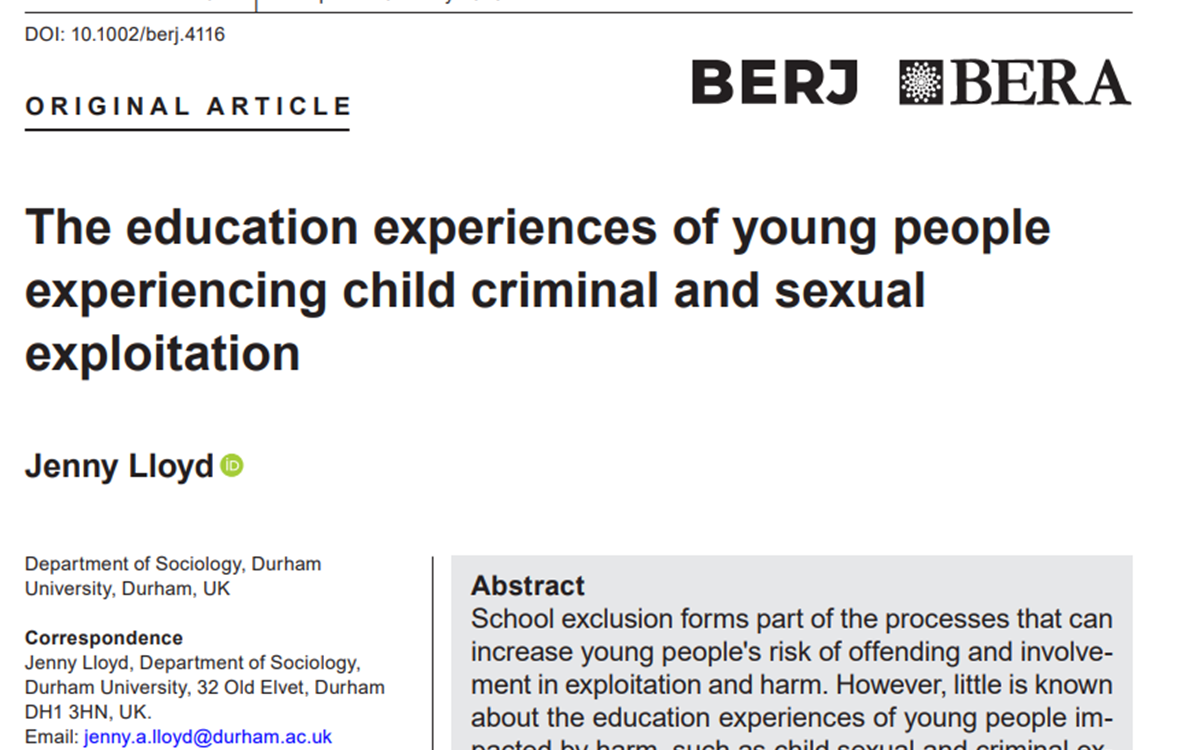
The education experiences of young people experiencing child criminal and sexual exploitation
Lloyd (2025). This paper presents findings from a survey with 17 children's and families' social care departments in England and Wales to understand the education experiences of children open to social care for extra-familial harm.
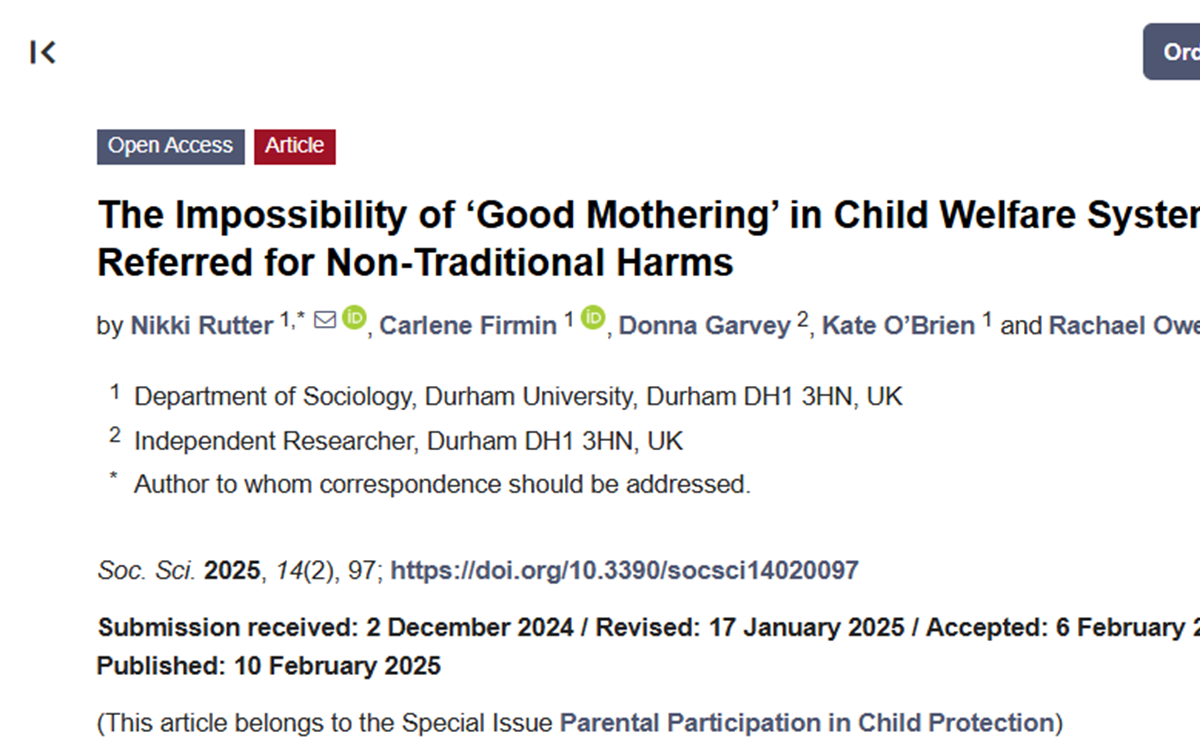
The Impossibility of ‘Good Mothering’ in Child Welfare Systems When Referred for Non-Traditional Harms
Rutter, N., Firmin, C., Garvey, D., O'Brien, K. and Owens, R. (2025). In this paper the authors argue that participatory and action-based research should be a preferred method of exploring mothers’ experiences of child welfare systems, opening routes for reform.
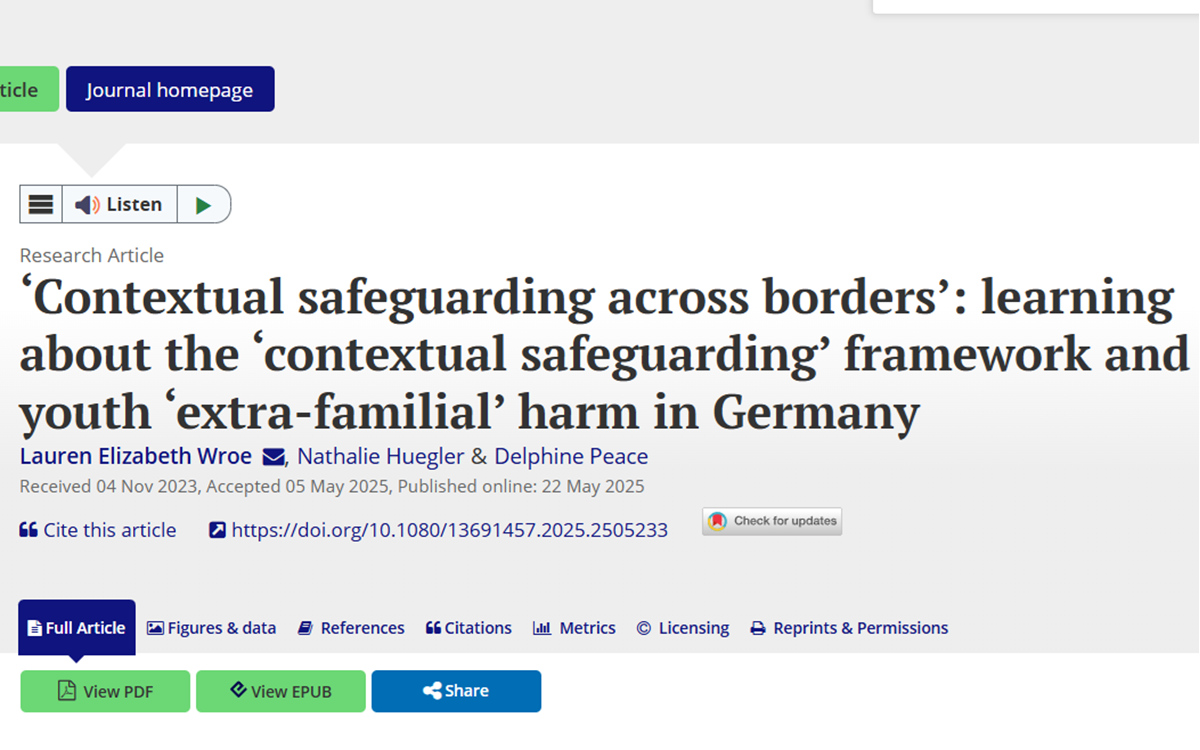
‘Contextual safeguarding across borders’: learning about the ‘contextual safeguarding’ framework and youth ‘extra-familial’ harm in Germany
Wroe, L., Huegler, N. and Peace, D. (2025). In this article, the authors share learning from a collaborative project involving researchers at Durham university and an International Non-Government Organisation supporting refugee girls in Germany.
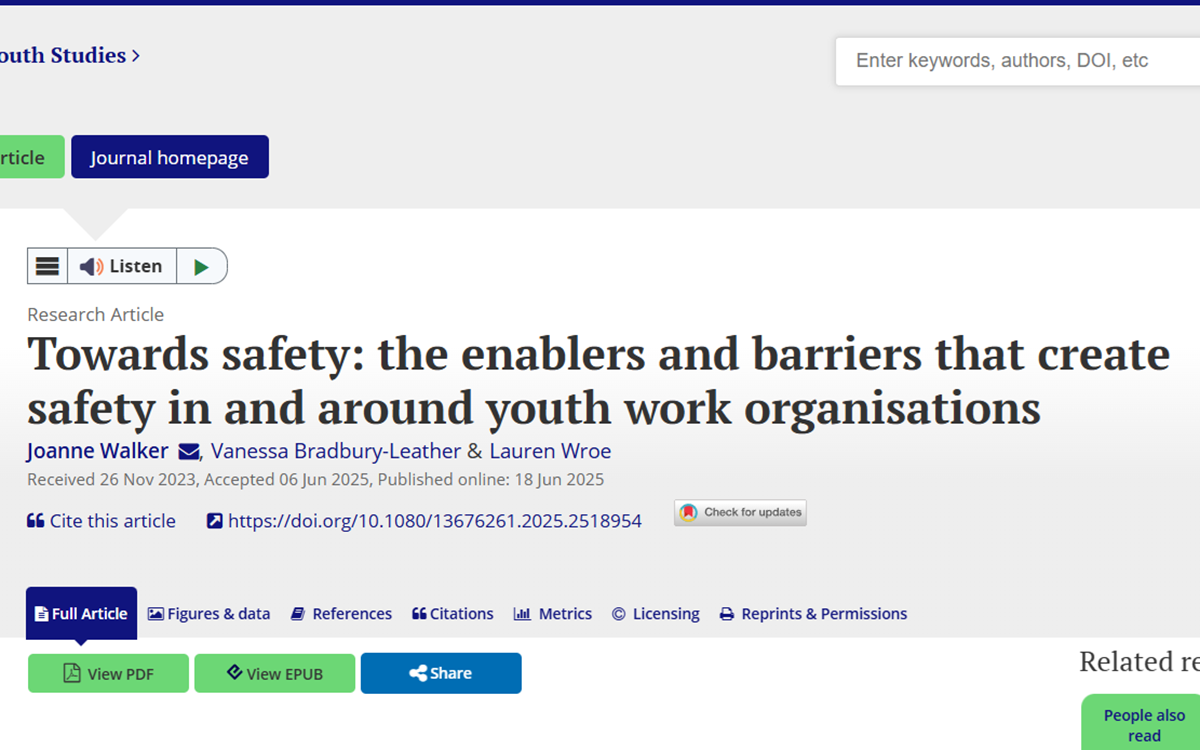
Towards safety: the enablers and barriers that create safety in and around youth work organisations
Walker, J., Bradbury-Leather, V. and Wroe, L. (2025). In light of significant failings to respond to extra-familial harm (EFH) within organisations tasked with statutory duties to protect and promote the welfare of young people, this paper considers the contribution youth work can play in this area.
2024
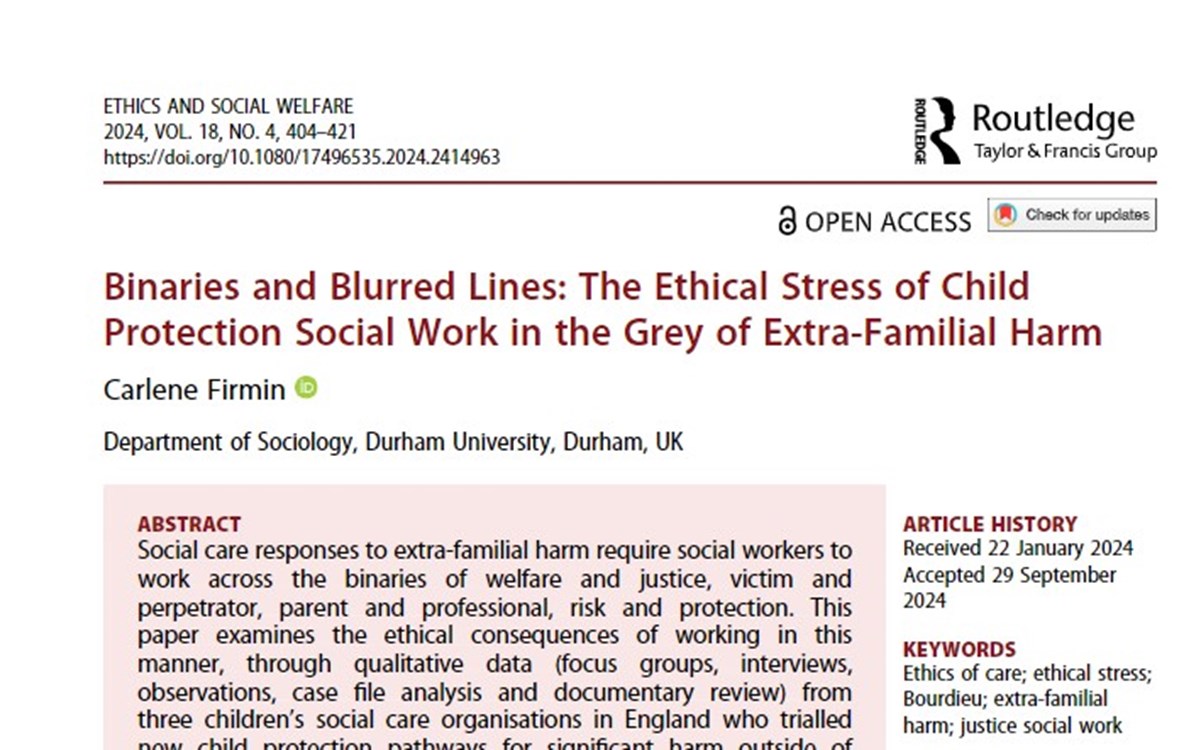
Binaries and Blurred Lines: The Ethical Stress of Child Protection Social Work in the Grey of Extra-Familial Harm.
Firmin, C. (2024). This publication explores the ethical consequences of social workers working across binaries such as welfare/justice and victim/perpetrator. The challenges of doing so evidence the importance of foregrounding social work values in the pursuit of welfare-based response to extra-familial harm.
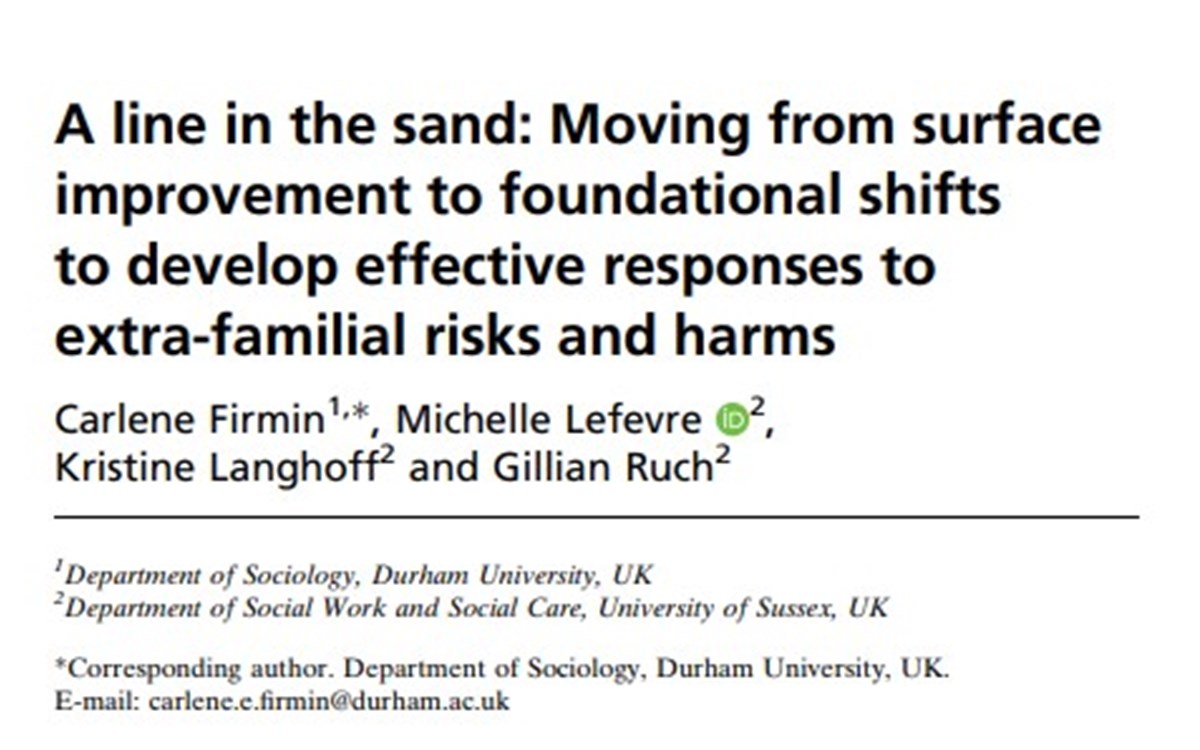
A line in the sand: Moving from surface improvement to foundational shifts to develop effective responses to extra-familial risks and harms
Firmin, C., Leferve, M., Langhoff, K. and Ruch, G. (2024). This article reports findings from a three year ethnography of six social care sites that used innovative responses to extra-familial risks and harms.
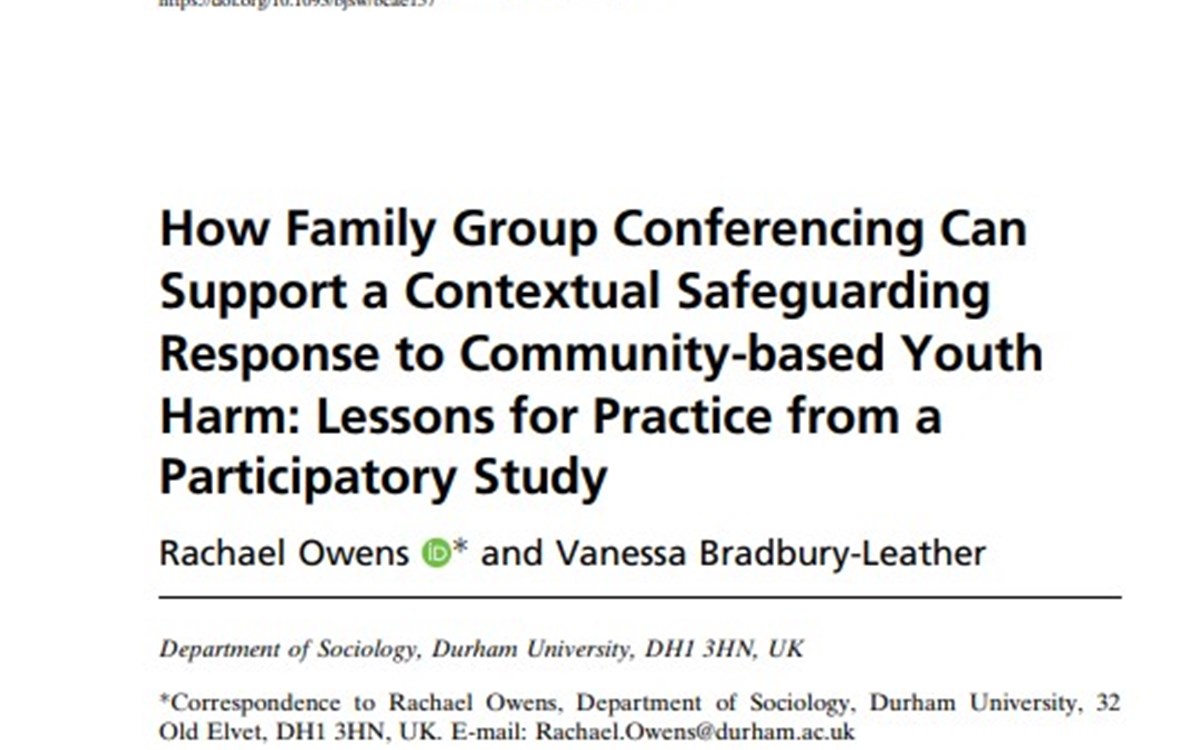
How Family Group Conferencing Can Support a Contextual Safeguarding Response to Community-based Youth Harm: Lessons for Practice from a Participatory Study
Owens, R. & Bradbury-Leather, V. (2024). This article reports on a study that brought Family Group Conferencing (FGC) and Contextual Safeguarding together to create an innovative practice response to extra-familial harm.
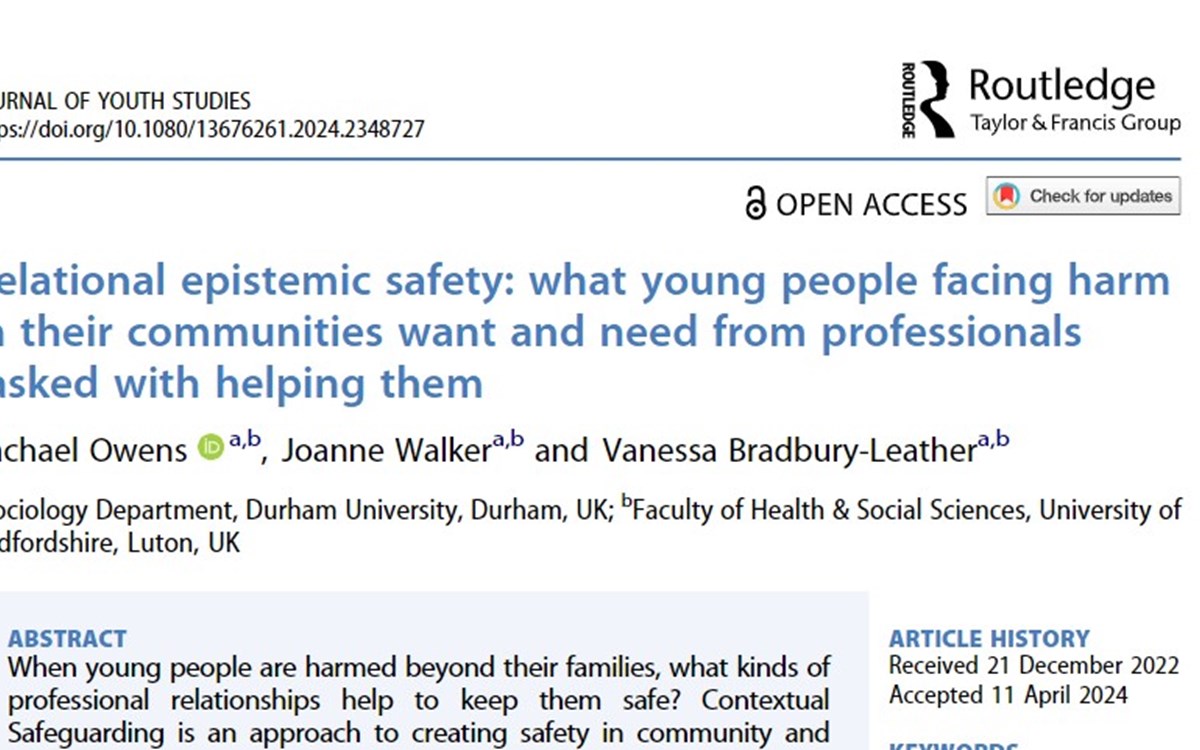
Relational epistemic safety: what young people facing harm in their communities want and need from professionals tasked with helping them
Owens, R., Walker, J., & Bradbury-Leather, V. (2024). Drawing on the findings from three pilot studies of multi-agency practice aimed at building safety for young people in extra-familial contexts, this paper discusses what adolescents need from their relationships with professionals. It demonstrates that for a relational orientation to be achieved, professionals need to be guided by how young people know the world.
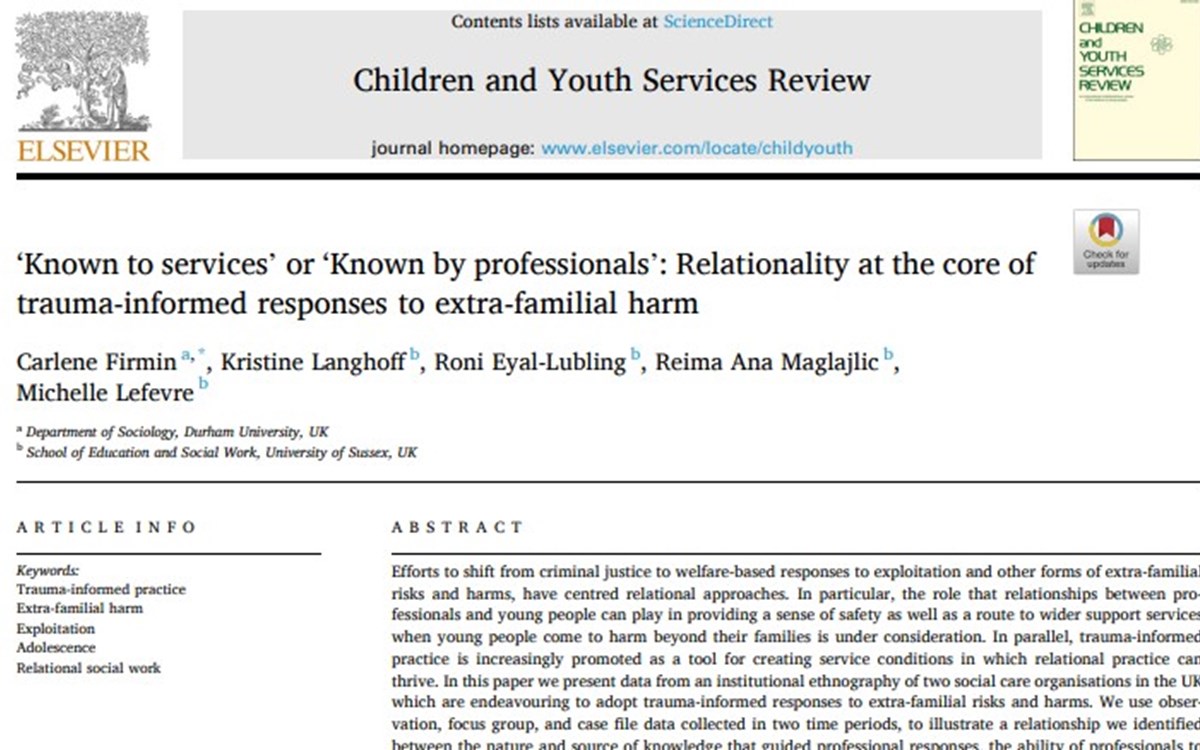
‘Known to services’ or ‘Known by professionals’: Relationality at the core of trauma-informed responses to extra-familial harm
Firmin et. al (2024) In this paper we present data from an institutional ethnography of two social care organisations in the UK which are endeavouring to adopt trauma-informed responses to extra-familial risks and harms. the article explores the way that many young people subject to intervention are ‘known-to-services’ and call for more responses in which young people are ‘known-by-professionals’ who are supporting them.
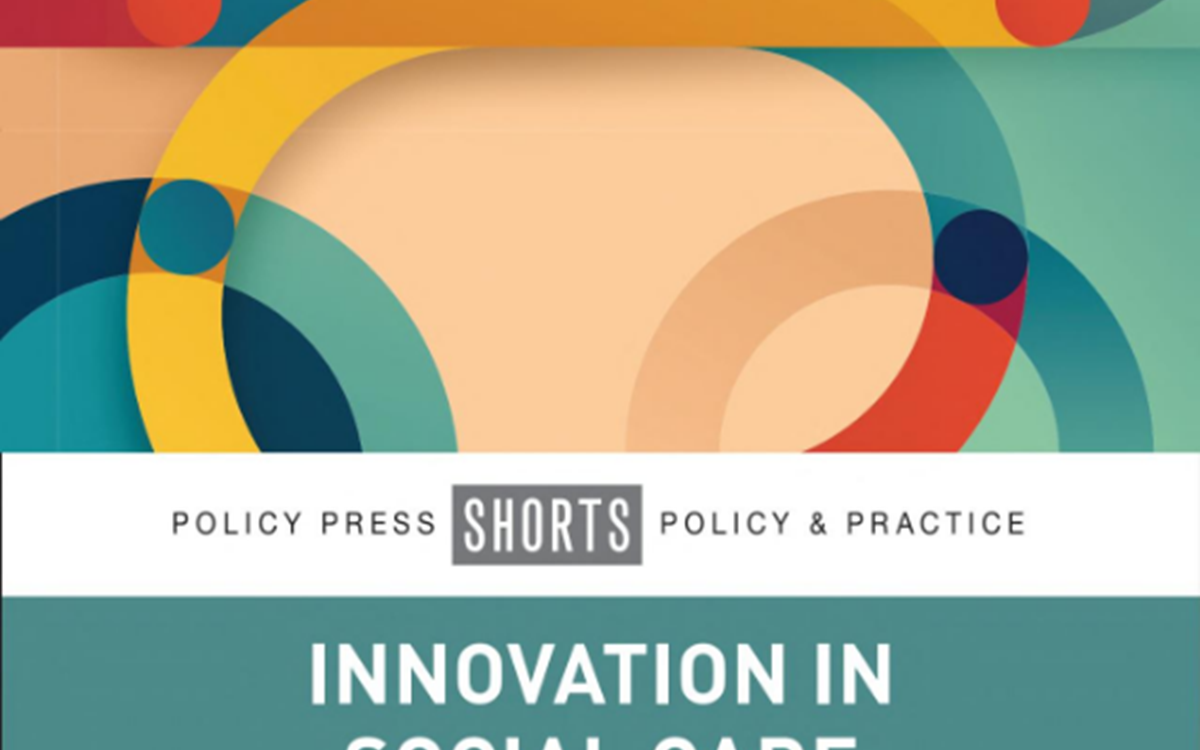
Innovation in Social Care: New Approaches for Young People Affected by Extra-Familial Risks and Harms
Lefevre et. al (2024). Based on the findings of the Innovate Project, this book asks how services can be re-envisioned and transformed through innovation. The authors offer insights into the core conditions necessary for socially just and practice-congruent social care innovation that responds to the distinctive, contemporary safeguarding concerns facing young people.
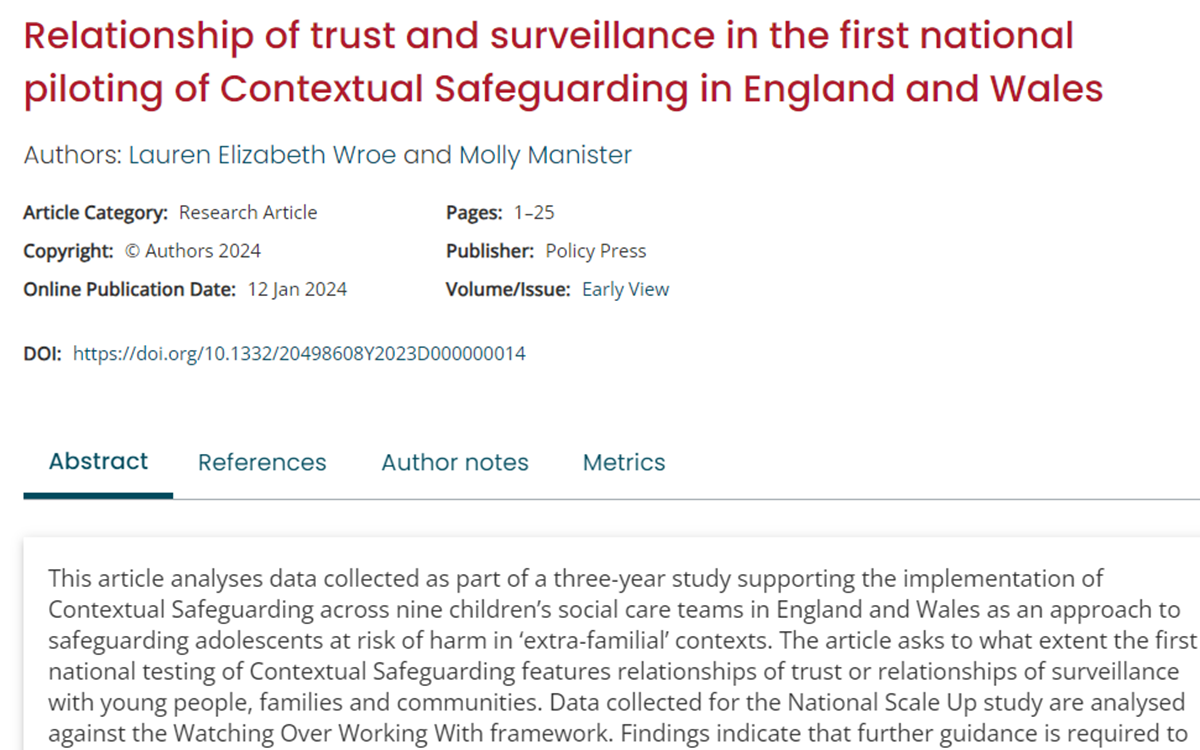
Relationship of trust and surveillance in the first national piloting of Contextual Safeguarding in England and Wales
Wroe & Manister (2024). The article asks to what extent the first national testing of Contextual Safeguarding features relationships of trust or relationships of surveillance with young people, families and communities.
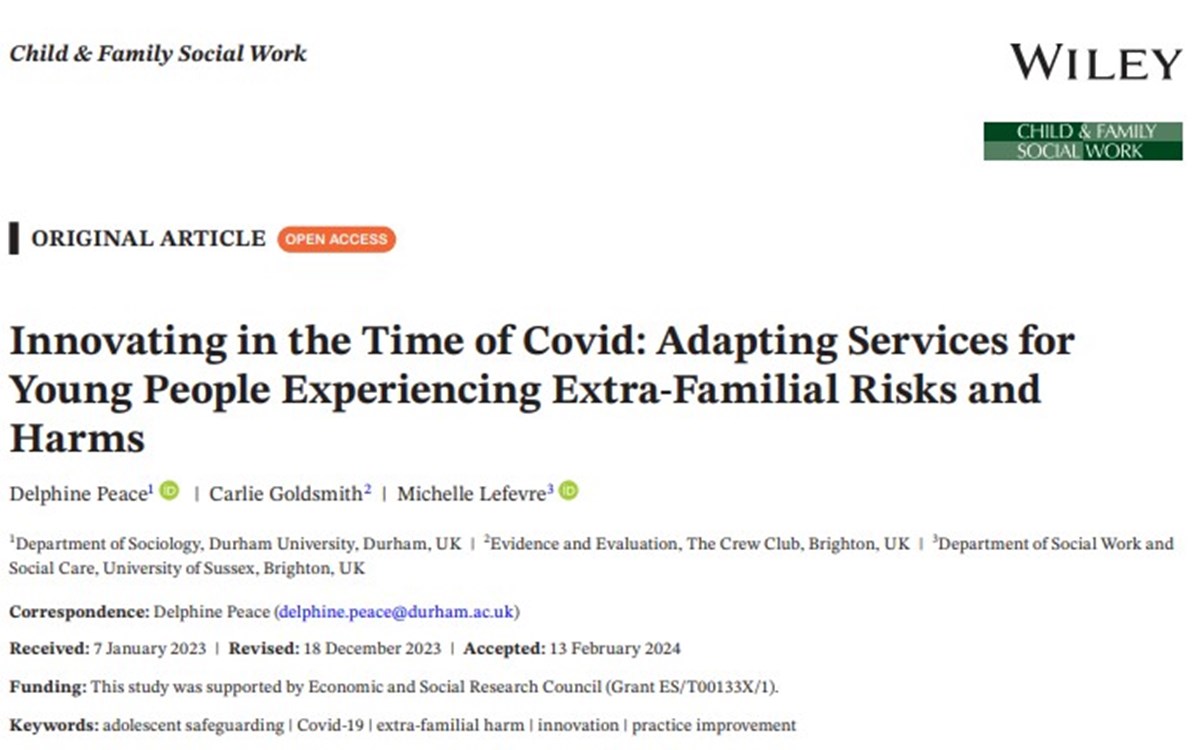
Innovating in the time of Covid: Adapting Services for Young People Experiencing Extra-Familial Risks and Harms
Peace et. al. (2024). This paper explores how seven organisations from the children's social care sector in England adapted their service during the Covid-19 pandemic restrictions to better meet the needs of young people experiencing extra-familial risks and harms.
2023
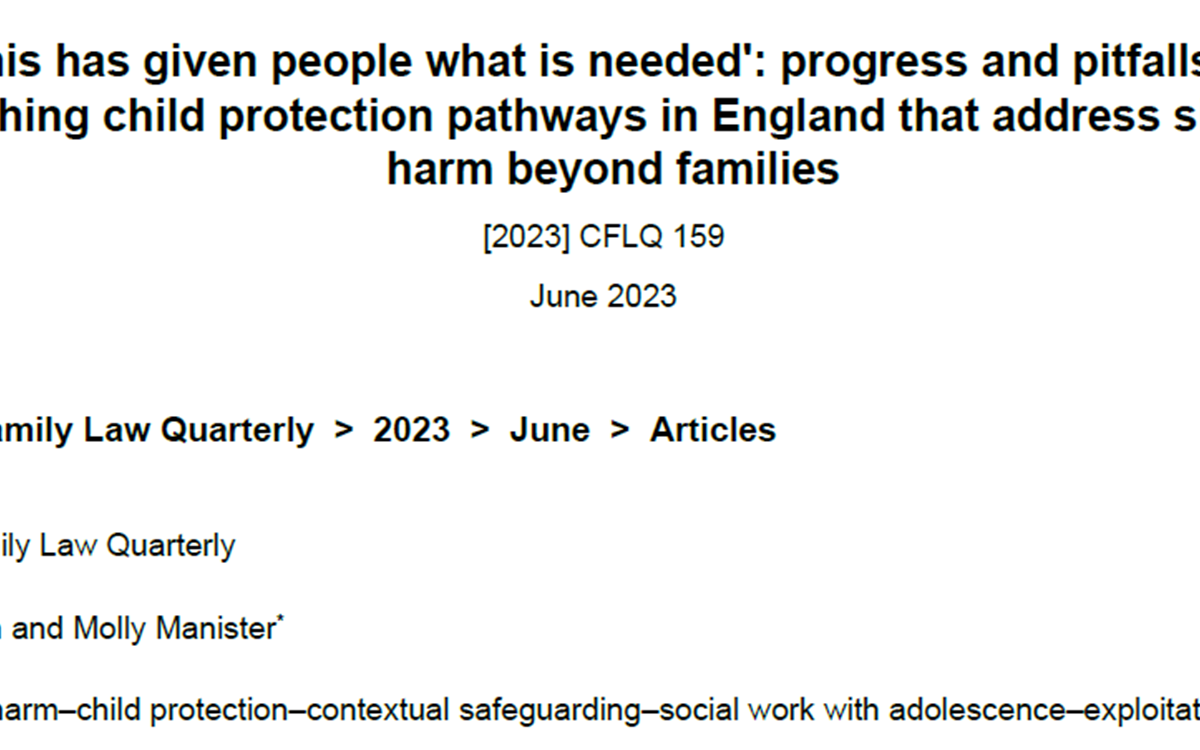
'This has given people what is needed': progress and pitfalls for establishing child protection pathways in England that address significant harm beyond families
Firmin & Manister (2023). In this paper we present the results from three English pilots of alternative child protection processes; ones intended to safeguard young people at risk beyond their family homes and relationships.
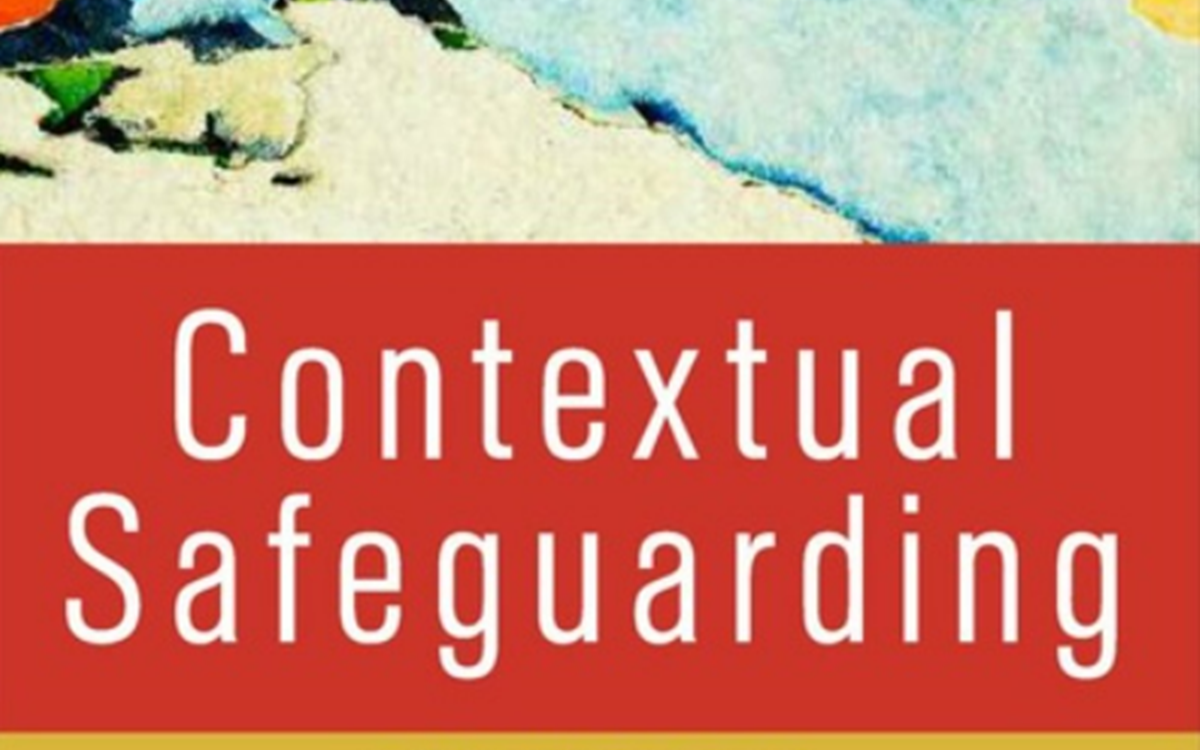
Contextual Safeguarding: The next chapter
Firmin & Lloyd (2023). For anyone interested in how we safeguard young people beyond their front doors, this book shows how much we have achieved and raises big questions about what more we need to do to ensure young people are safe – whatever the context.
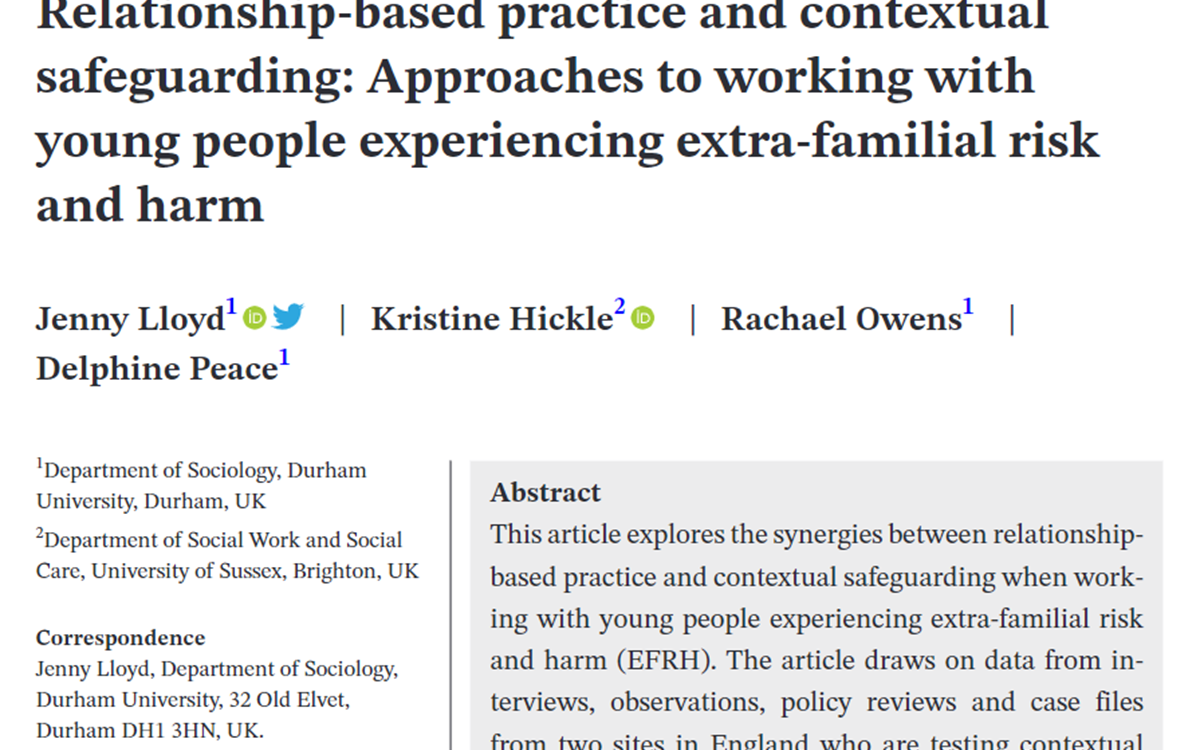
Relationship-based practice and contextual safeguarding: Approaches to working with young people experiencing extra-familial risk and harm
Lloyd et. al (2023). This article explores the synergies between relationship-based practice and contextual safeguarding when working with young people experiencing extra-familial risk and harm (EFRH).
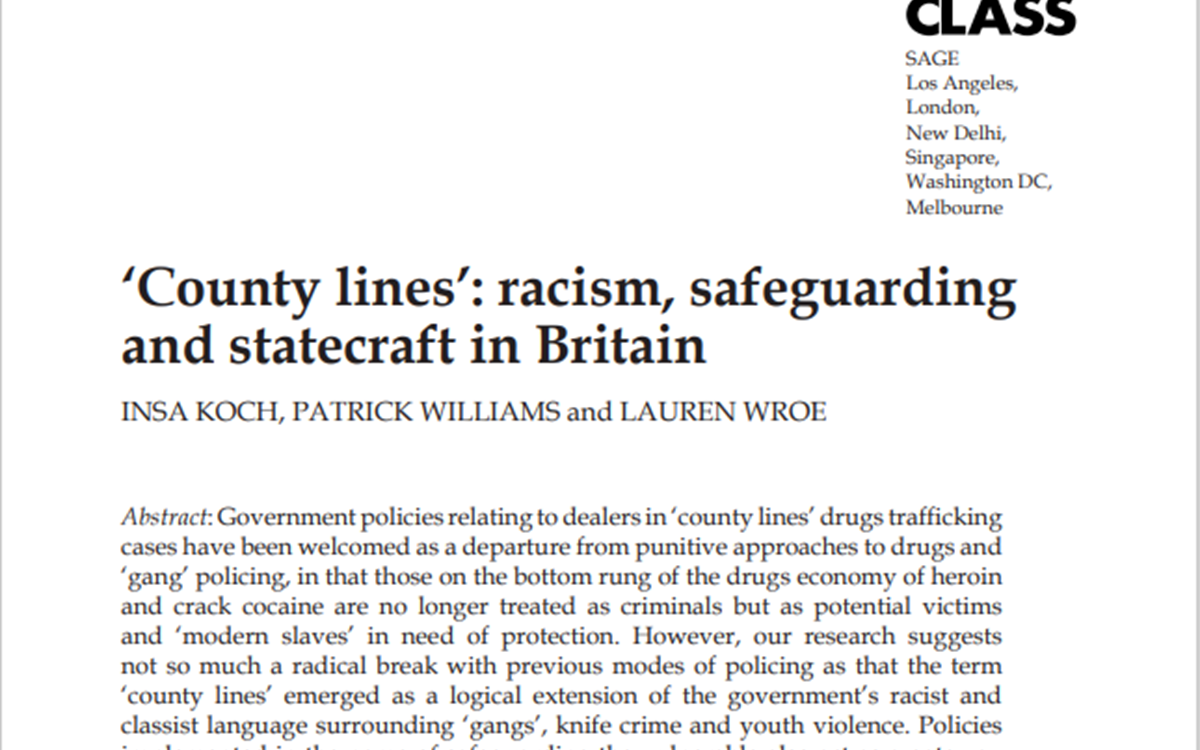
‘County lines’: racism, safeguarding and statecraft in Britain
Koch, Williams & Wroe (2023). This paper critically explores how the term ‘county lines’ functions as a logical extension of the government’s racist and classist language surrounding ‘gangs’, knife crime and youth violence, which ultimately leads to the criminalisation of the ‘Black criminal other’ at a time of moral and political crisis.
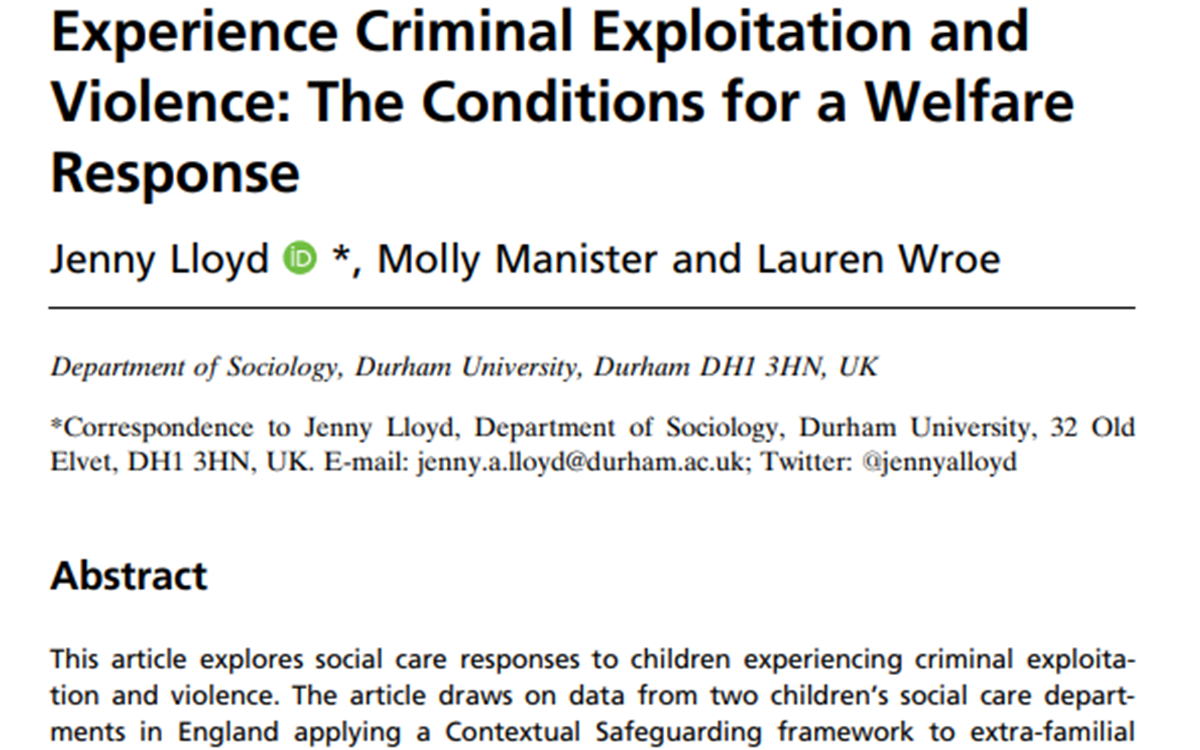
Social Care Responses to Children who Experience Criminal Exploitation and Violence: The Conditions for a Welfare Response
Lloyd, Manister & Wroe (2023). This article explores social care responses to children experiencing criminal exploitation and violence. Follow this link to access the paper and a short webinar.

‘Relocating’ Adolescents from Risk beyond the Home: What Do We Learn When We Ask about Safety?
Wroe, Peace & Firmin (2023). There is an absence of evidence supporting the use of ‘out-of-area placements’ to address risks adolescents face beyond the home. Using participatory approaches to research design and data collection, this article asks what do we learn about the impact of relocations when we ask about safety?
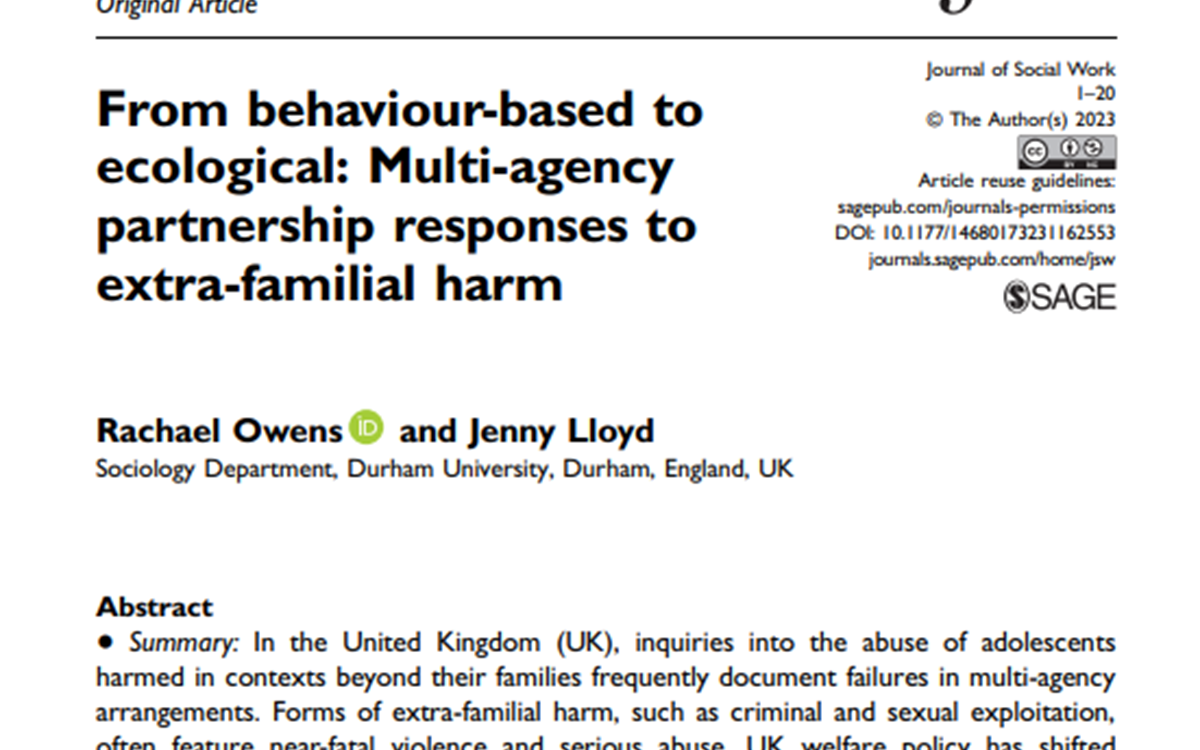
From behaviour-based to ecological: Multi-agency partnership responses to extra-familial harm
Owens & Lloyd (2023). This articles explores multi-agency responses to extra-familial harm and the importance of acknowledging differing approaches. This link takes you to our 'improving multi-agency partnerships page' where you can access the article and free practitioner resources.
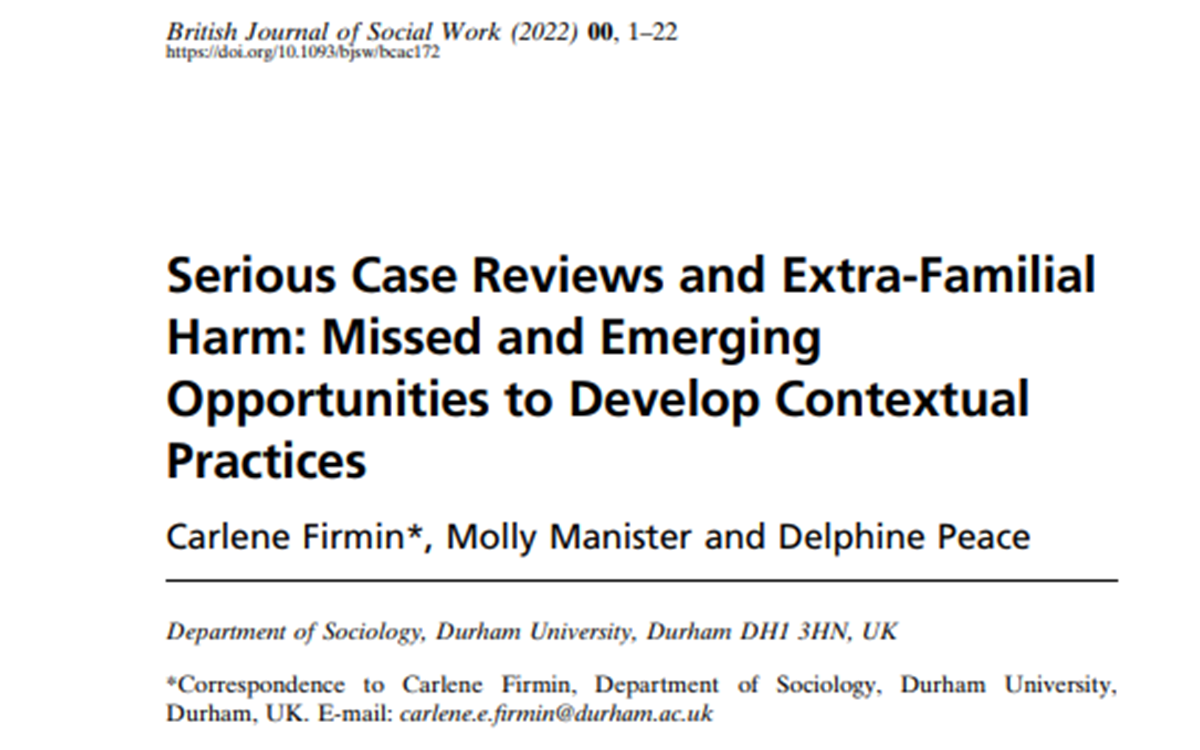
Serious Case Reviews and Extra-Familial Harm: Missed and Emerging Opportunities to Develop Contextual Practices
Firmin, Manister and Peace (2023). This study examined whether reviews of serious incidents (serious case reviews (SCRs)) provide an evidence-base for understanding the contextual dynamics of EFH and/or developing contextual responses.
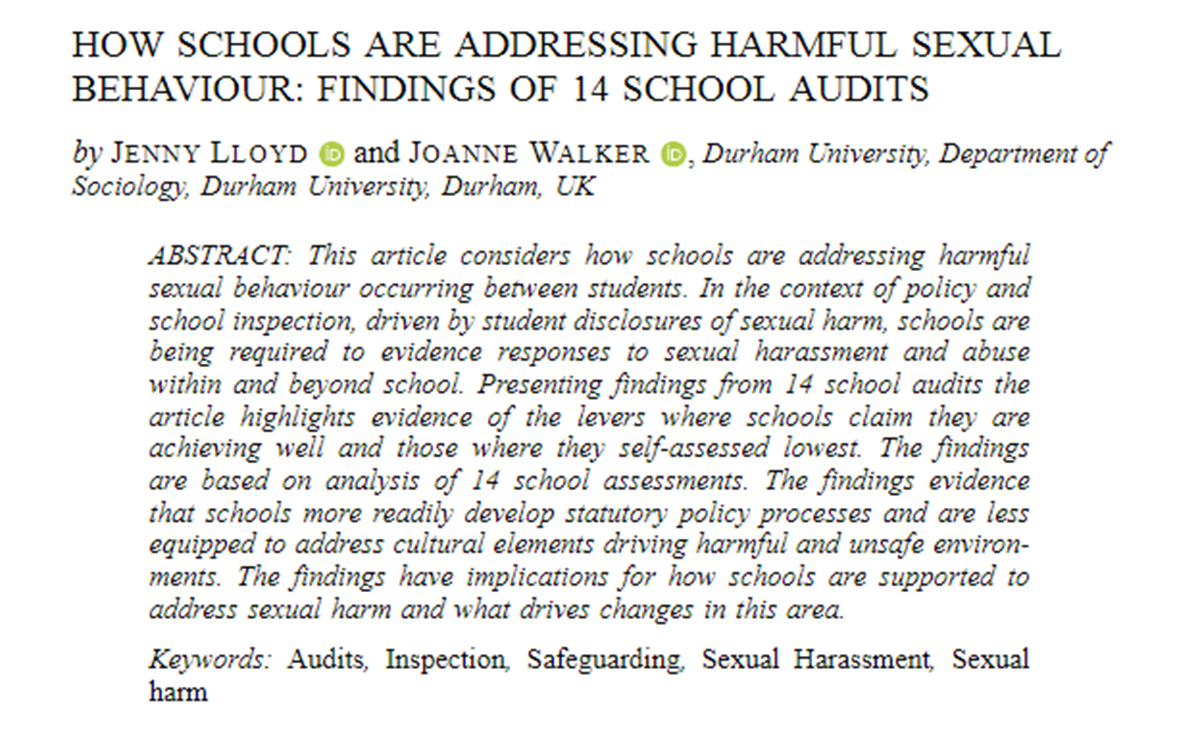
How Schools are Addressing Harmful Sexual Behaviour: findings of 14 School Audits
Lloyd & Walker (2023). This article considers how schools are addressing harmful sexual behaviour occurring between students. In the context of policy and school inspection, driven by student disclosures of sexual harm, schools are being required to evidence responses to sexual harassment and abuse within and beyond school. Presenting findings from 14 school audits the article highlights evidence of the levers where schools claim they are achieving well and those where they self-assessed lowest.
2022
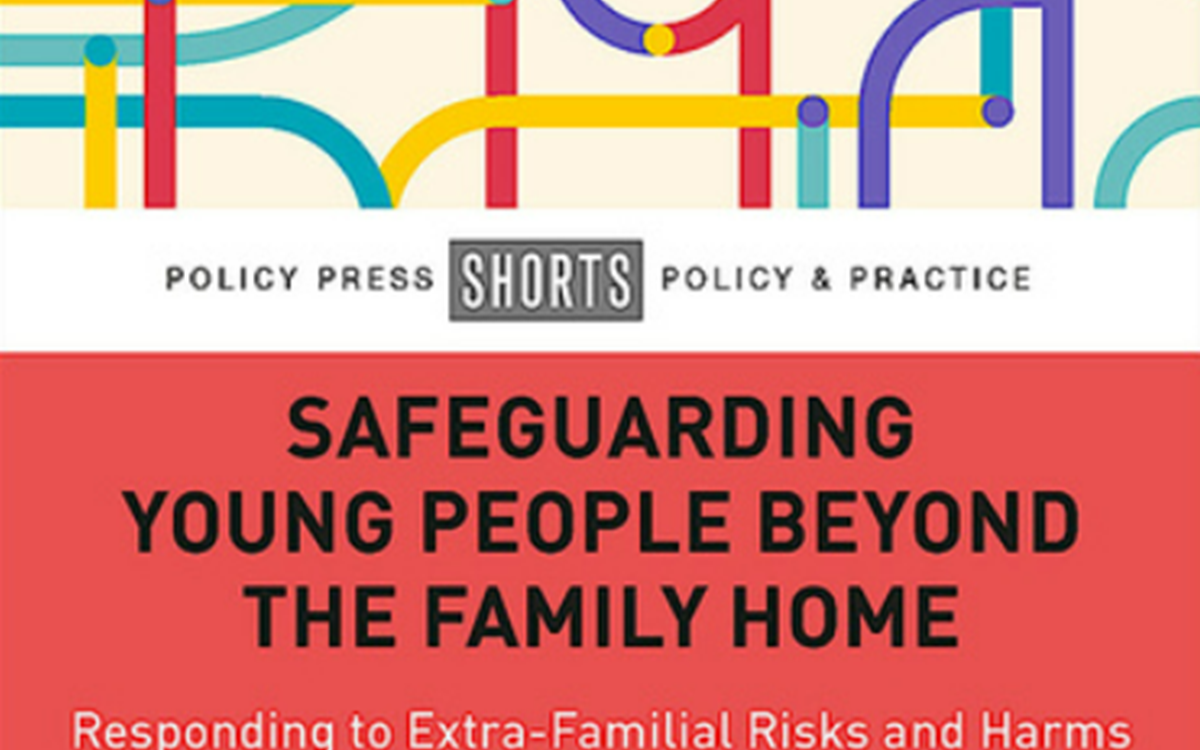
Safeguarding Young People Beyond the Family Home
Firmin et. al. (2022). This book analyses the results of the first rapid evidence assessment of social care organisations’ responses to risks and harms outside the home across 10 countries.
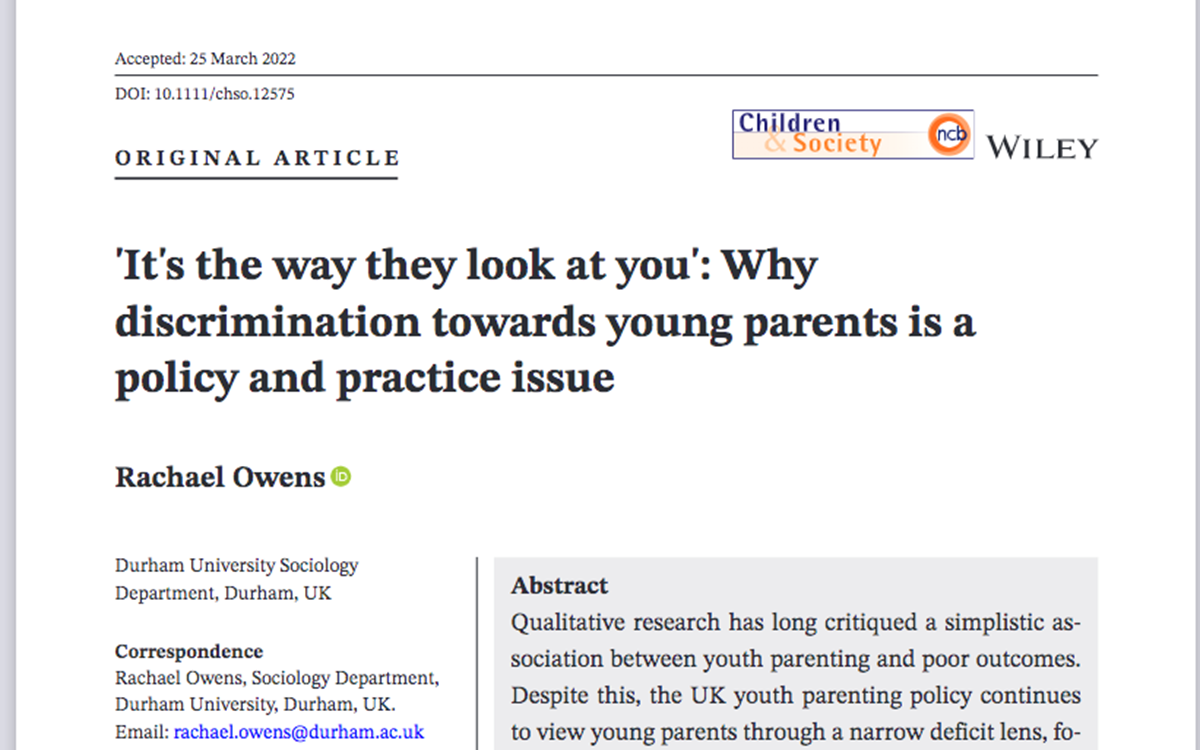
'It's the way they look at you': Why discrimination towards young parents is a policy and practice issue.
Owens (2022). This paper brings together the direct accounts of young parents' experiences, with ethnographic observation of practice, to argue that discrimination is the critical issue associated with being a young parent.
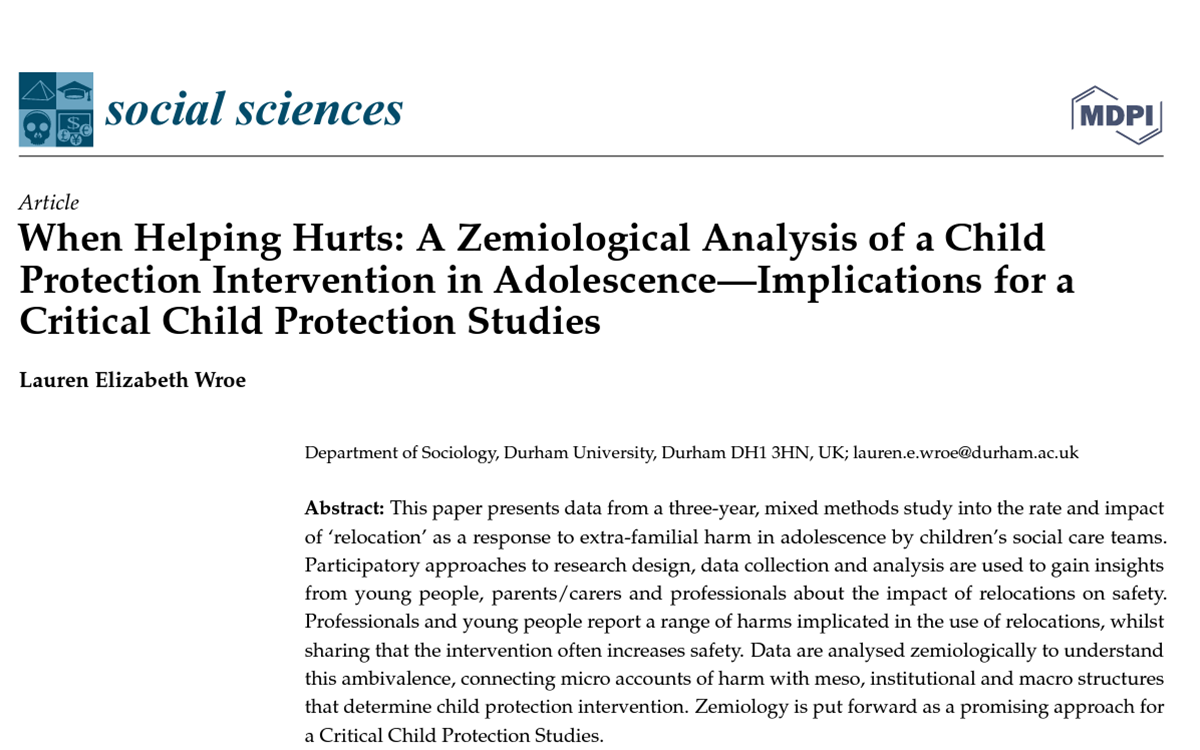
When Helping Hurts: A Zemiological Analysis of a Child Protection Intervention in Adolescence—Implications for a Critical Child Protection Studies
Wroe (2022). This paper presents data from a three-year, mixed methods study into the rate and impact of ‘relocation’ as a response to extra-familial harm in adolescence by children’s social care teams.
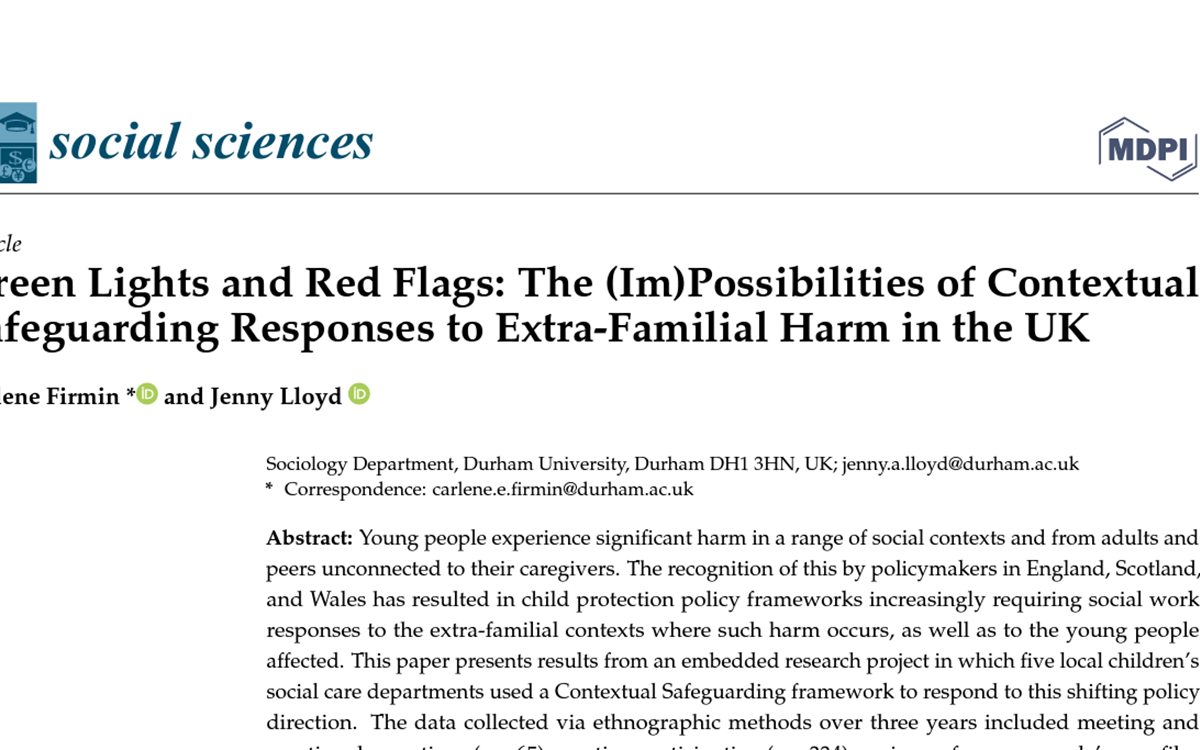
Green Lights and Red Flags: The (Im)Possibilities of Contextual Safeguarding Responses to Extra-Familial Harm in the UK
Firmin & Lloyd (2022). This paper presents results from an embedded research project in which five local children’s
social care departments used a Contextual Safeguarding framework to respond to a shifting policy
direction.
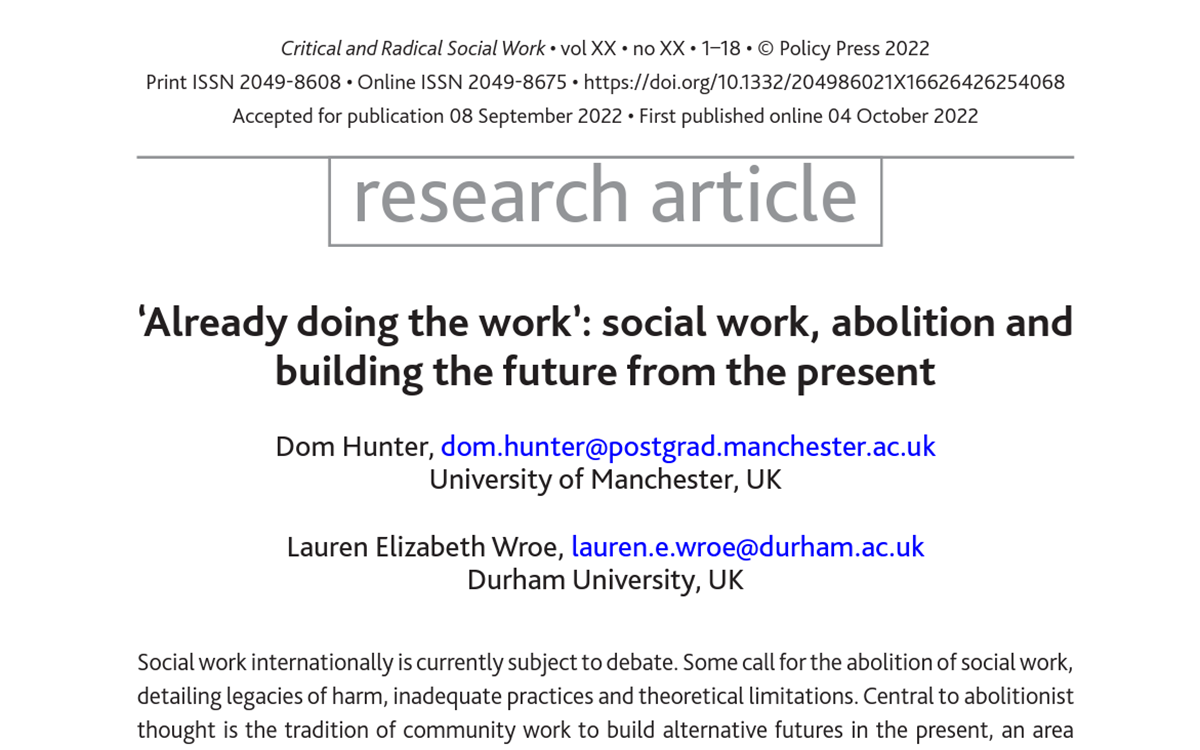
‘Already doing the work’: social work, abolition and building the future from the present
Hunter & Wroe (2022). This article adopts an auto-ethnographic method, drawing on the authors’ experiences of social work in the UK – in childhood and as a professional career, respectively – to consider the limitations of social work responses to childhood harm, alongside existing community harm-reduction practices.
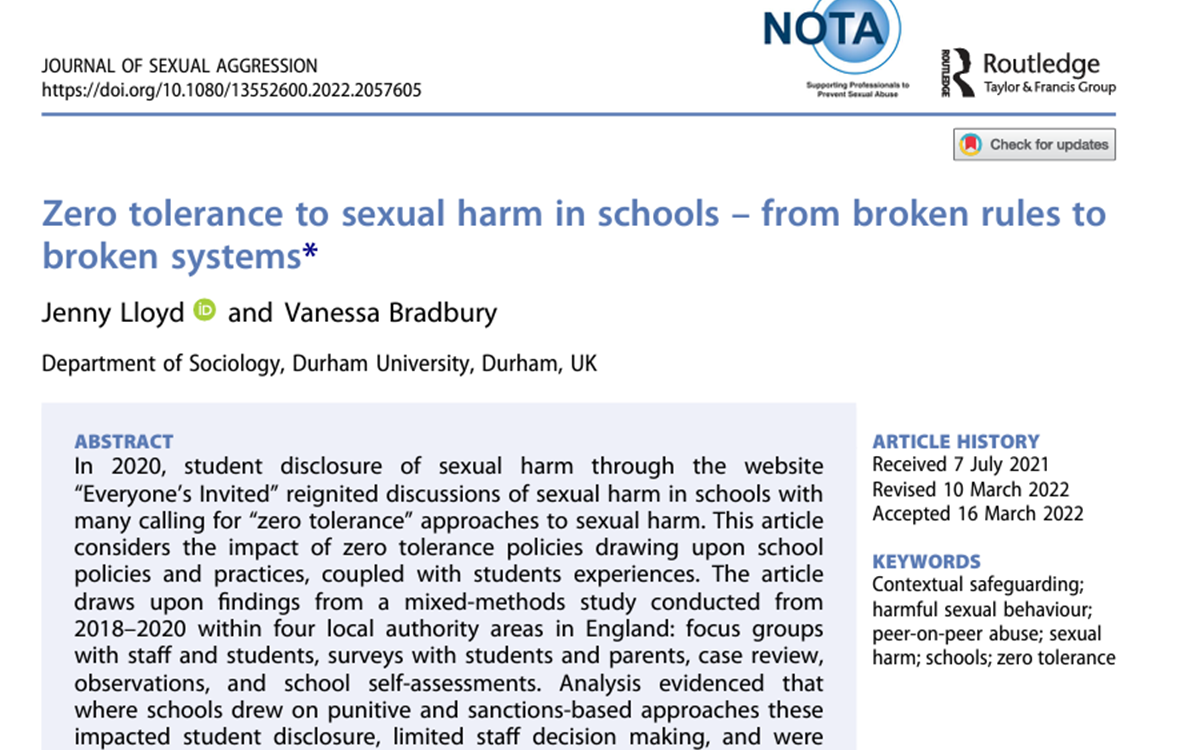
Zero tolerance to sexual harm in schools – from broken rules to broken systems
Lloyd & Bradbury (2022). This article considers the impact of zero tolerance policies drawing upon school policies and practices, coupled with students experiences.
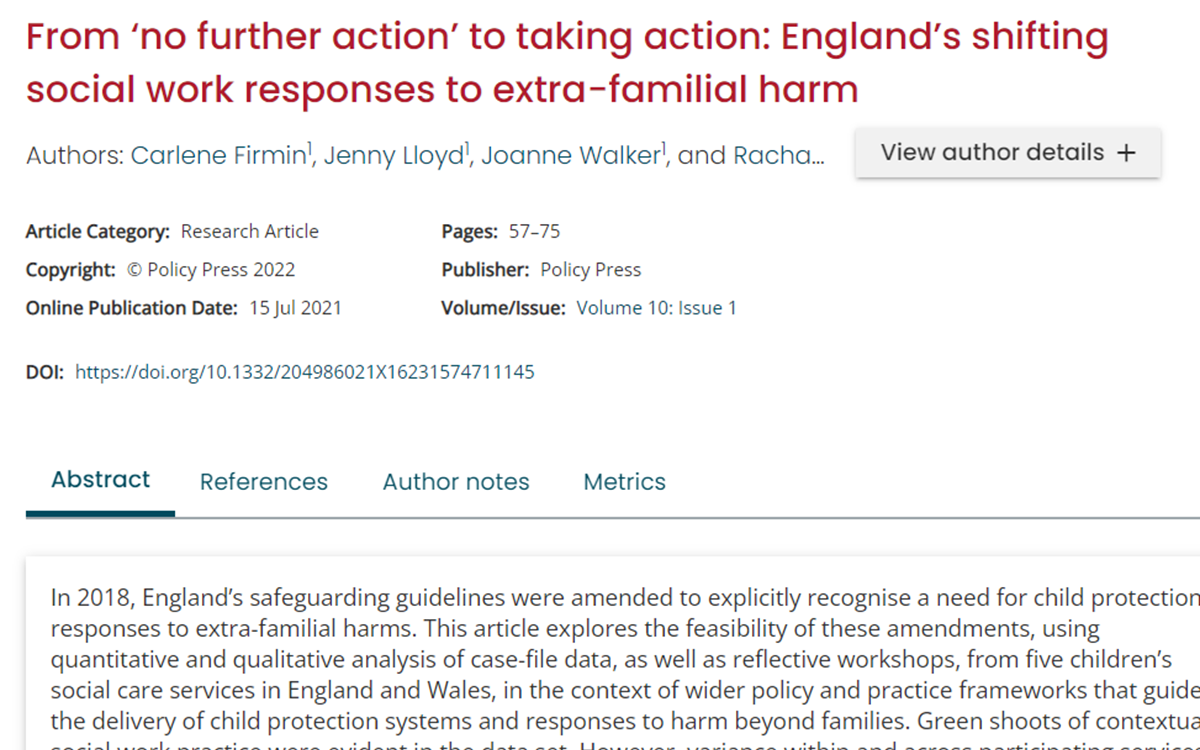
From ‘no further action’ to taking action: England’s shifting social work responses to extra-familial harm
Firmin, Lloyd, Walker & Owens (2022). In 2018, England’s safeguarding guidelines were amended to explicitly recognise a need for child protection responses to extra-familial harms. This article explores the feasibility of these amendments.

Last Resort or Best Interest? Exploring the Risk and Safety Factors That Inform the Rates of Relocation for Young People Abused in Extra-Familial Settings
Firmin, Wroe & Bernard (2022). Using survey and interview data, this article examines how relocations are used in response to extra-familial harm (EFH) in thirteen children’s services departments in England and Wales.
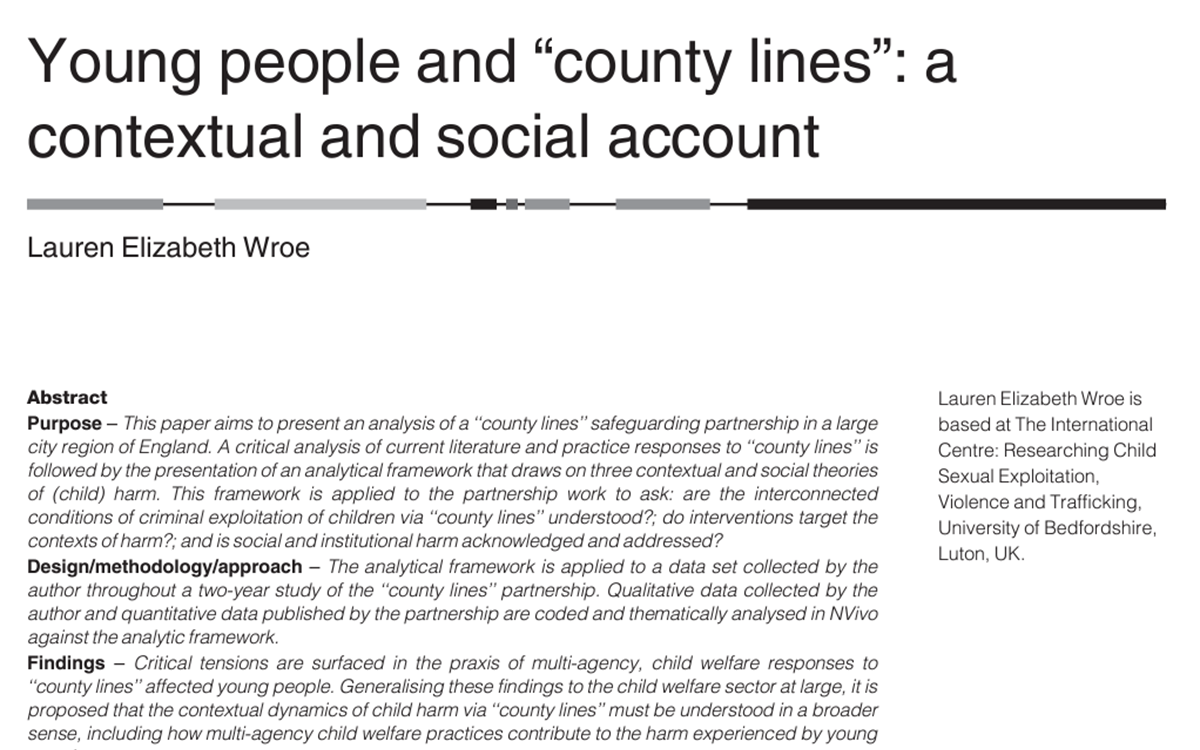
Young people and “county lines”: a contextual and social account
Wroe (2022). This paper aims to present an analysis of a “county lines” safeguarding partnership in a large city region of England.
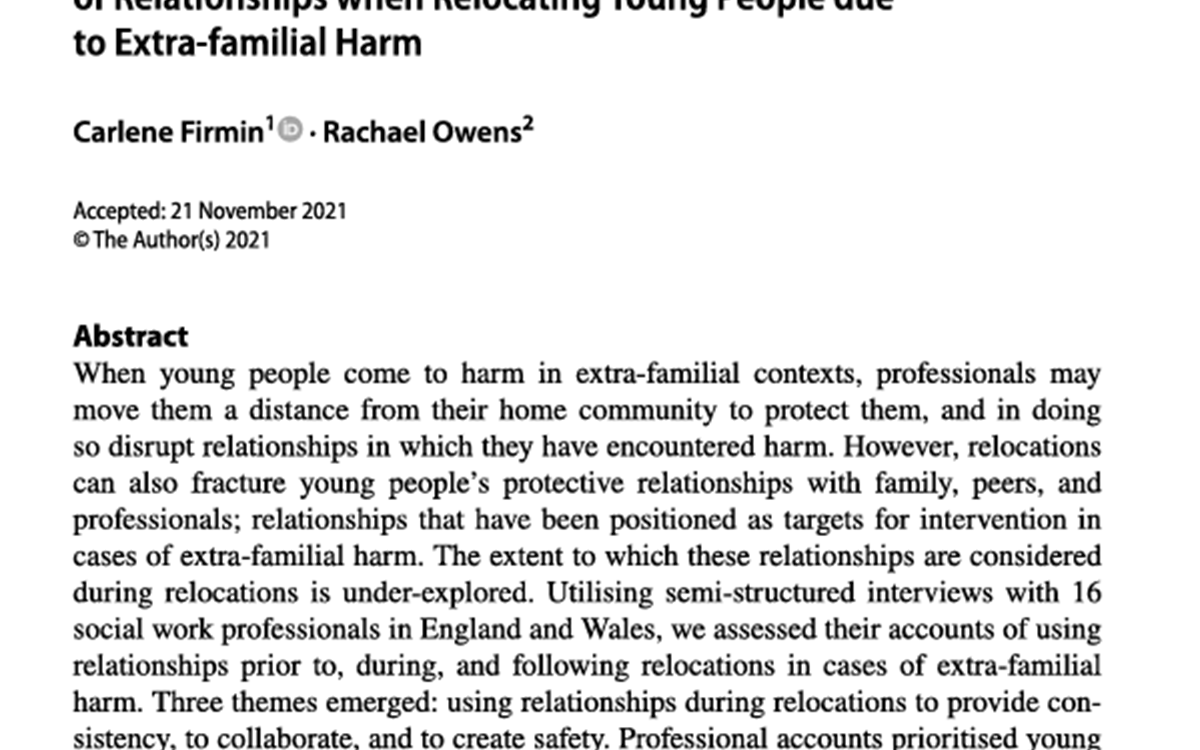
Holding It Together? Professional Perspectives on the Role of Relationships when Relocating Young People due to Extra-familial Harm
Firmin and Owens (2022). When young people come to harm in extra-familial contexts, professionals may move them a distance from their home community to protect them, and in doing so disrupt relationships in which they have encountered harm. However, relocations can also fracture young people’s protective relationships with family, peers, and professionals; relationships that have been positioned as targets for intervention in cases of extra-familial harm.
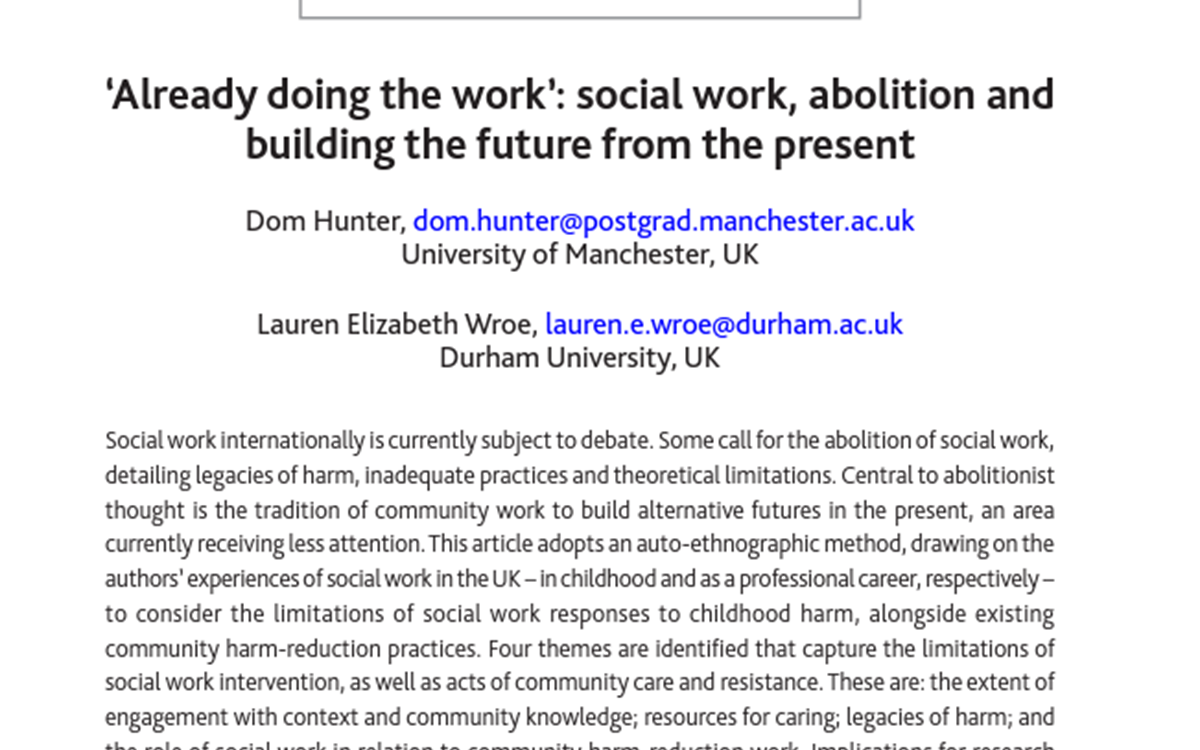
‘Already doing the work’: social work, abolition and building the future from the present
Hunter & Walker (2022). This article adopts an auto-ethnographic method, drawing on the authors’ experiences of social work in the UK – in childhood and as a professional career, respectively – to consider the limitations of social work responses to childhood harm, alongside existing community harm-reduction practices.
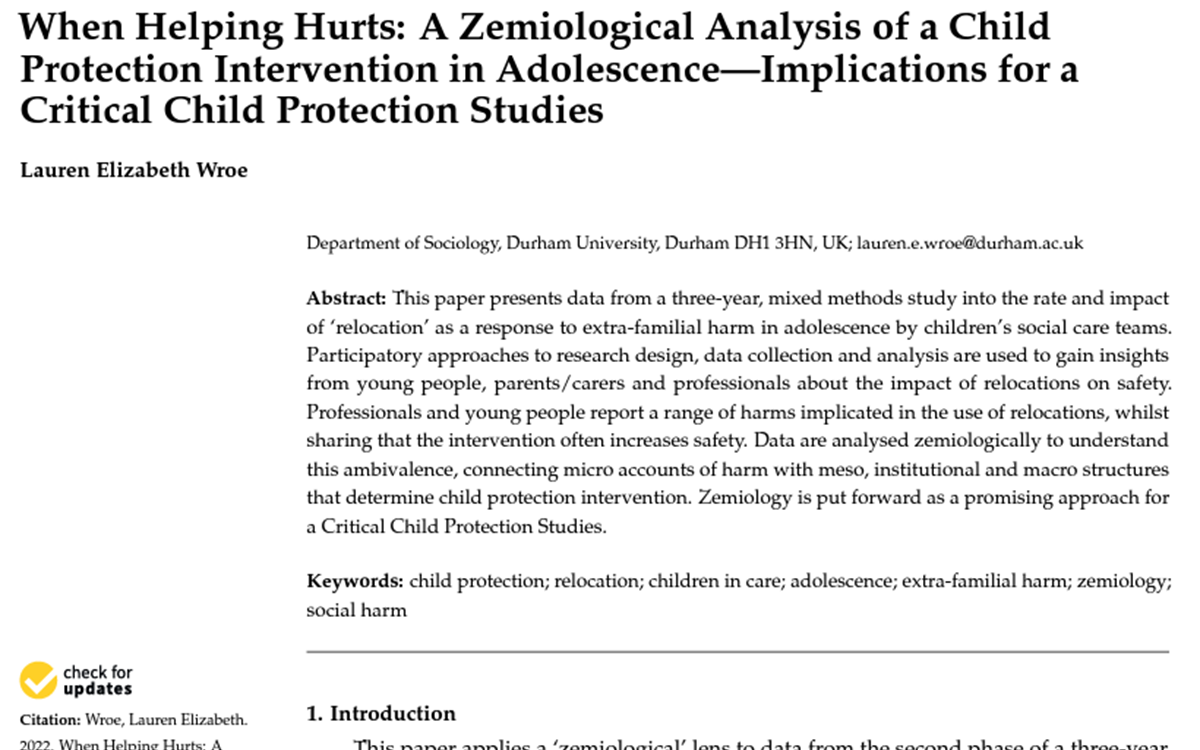
When Helping Hurts: A Zemiological Analysis of a Child Protection Intervention in Adolescence—Implications for a Critical Child Protection Studies
Wroe (2022). This paper presents data from a three-year, mixed methods study into the rate and impact of ‘relocation’ as a response to extra-familial harm in adolescence by children’s social care teams.
2021
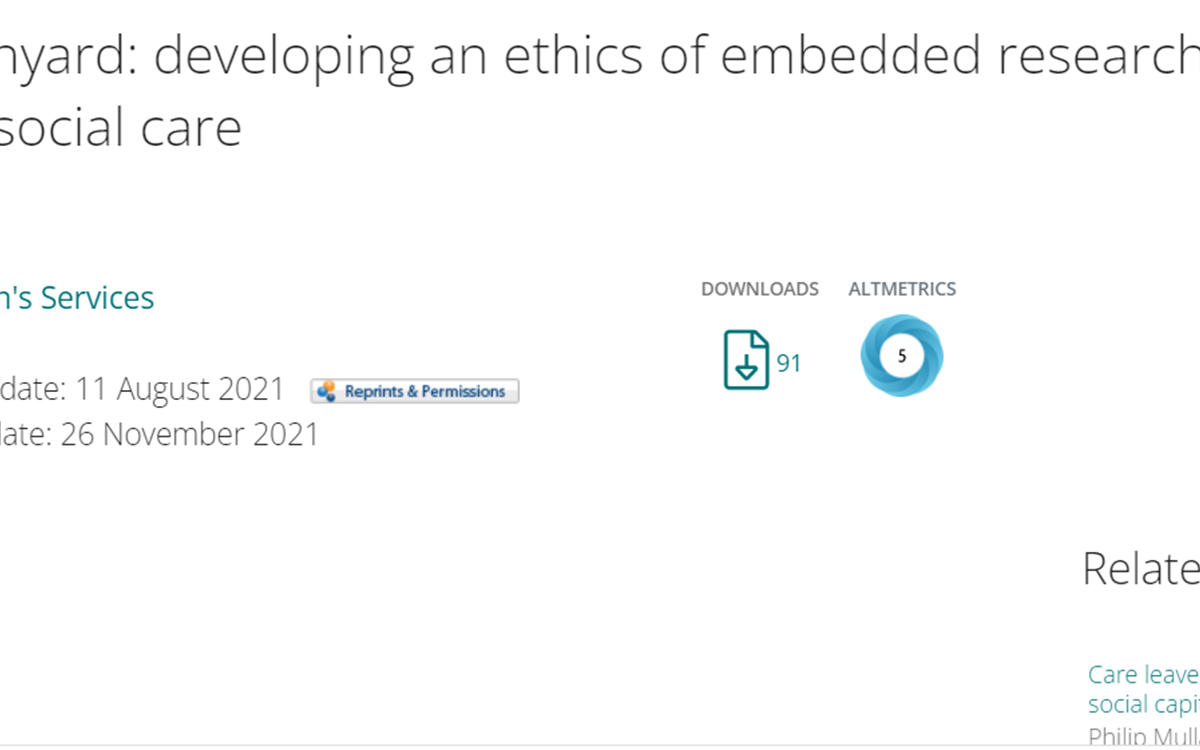
Life in a lanyard: developing an ethics of embedded research methods in children’s social care
Lloyd (2021). This paper considers the opportunities for embedded methodologies for research into children’s social care and the ethics of this method.
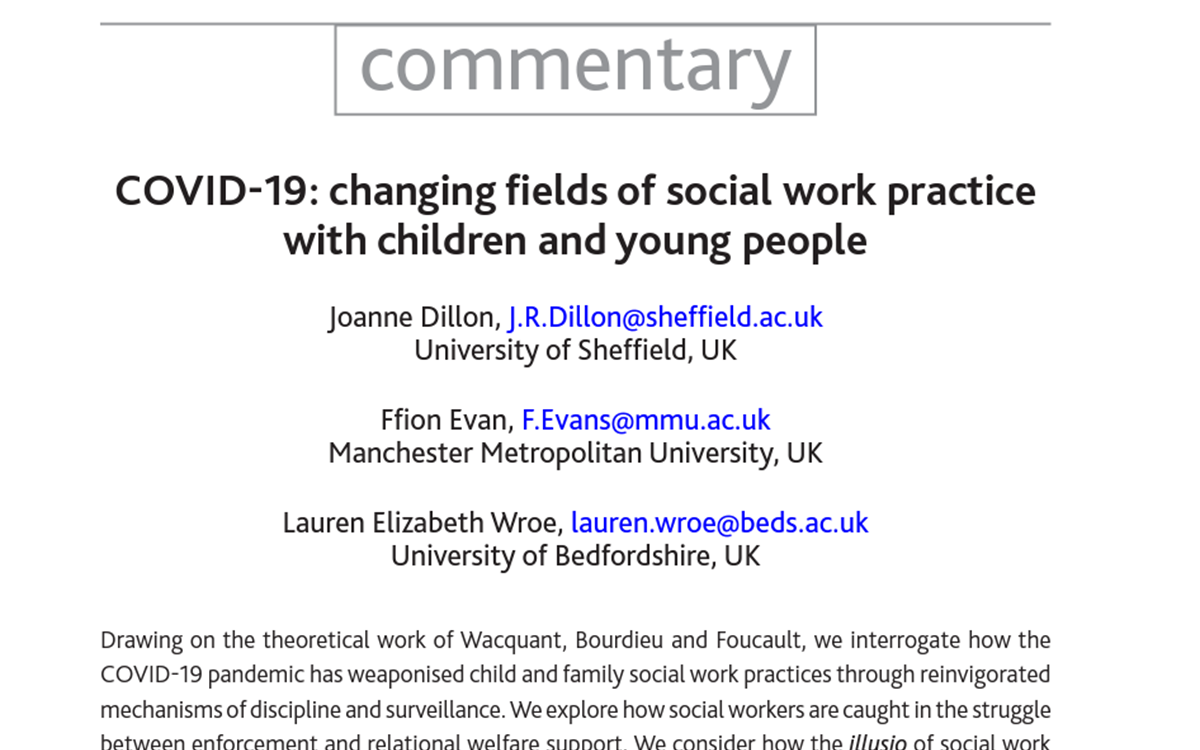
COVID-19: changing fields of social work practice with children and young people
Dillon, Evans & Wroe (2021). Drawing on the theoretical work of Wacquant, Bourdieu and Foucault, we interrogate how the COVID-19 pandemic has weaponised child and family social work practices through reinvigorated mechanisms of discipline and surveillance.

COVID-19: changing fields of social work practice with children and young people
Dillon, Evans & Wroe (2021). Drawing on the theoretical work of Wacquant, Bourdieu and Foucault, we interrogate how the COVID-19 pandemic has weaponised child and family social work practices through reinvigorated mechanisms of discipline and surveillance.
2020
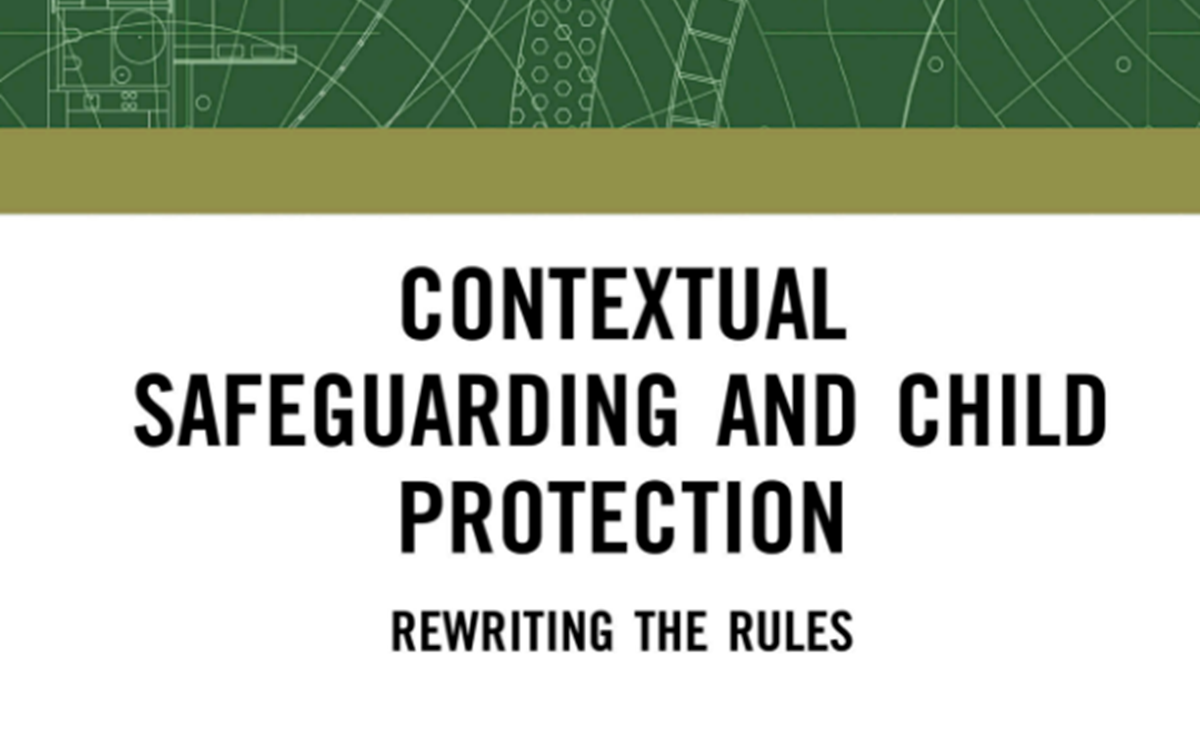
Contextual Safeguarding and Child Protection Rewriting the Rules
Firmin (2020). This book offers a complete account of Contextual Safeguarding theory, policy, and practice frameworks for the first time. It highlights the particular challenge of extra-familial routes through which young people experience significant harm, such as child sexual exploitation, criminal exploitation, serious youth violence, domestic abuse in teenage relationships, bullying, gang-association, and radicalisation.
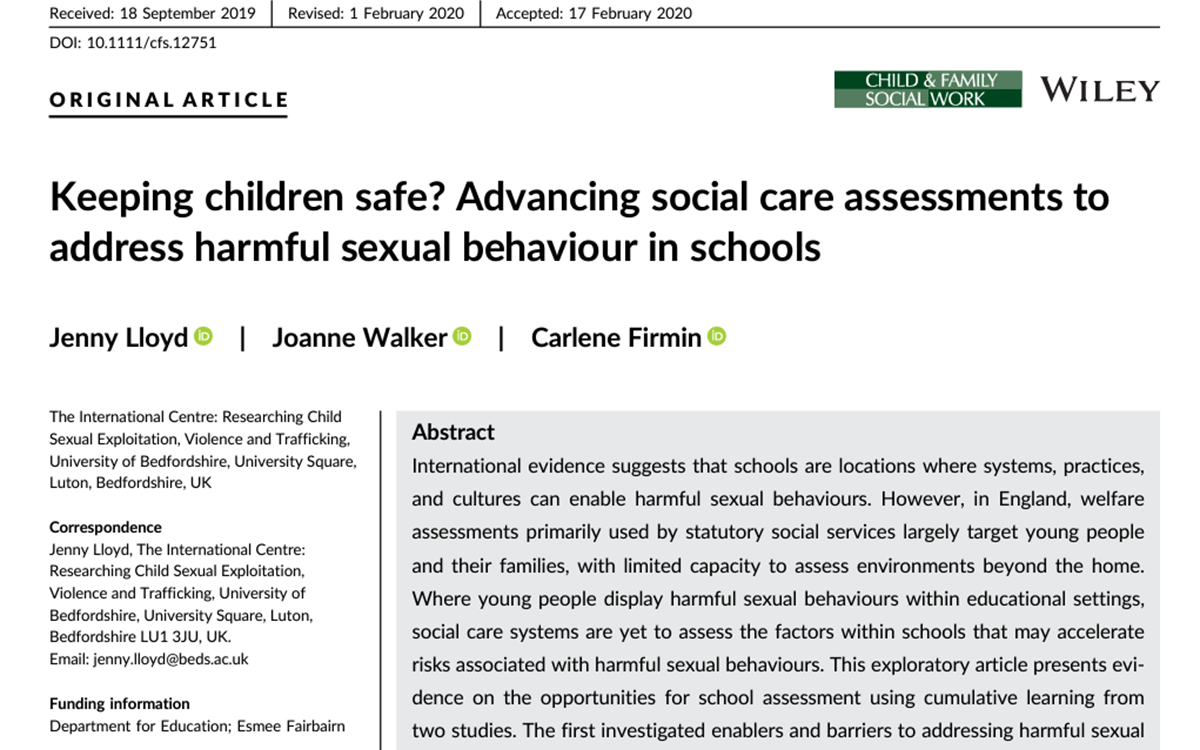
Keeping children safe? Advancing social care assessments to address harmful sexual behaviour in schools
Lloyd, Walker & Firmin (2020). This exploratory article presents evidence on the opportunities for school assessment using cumulative learning from two studies.
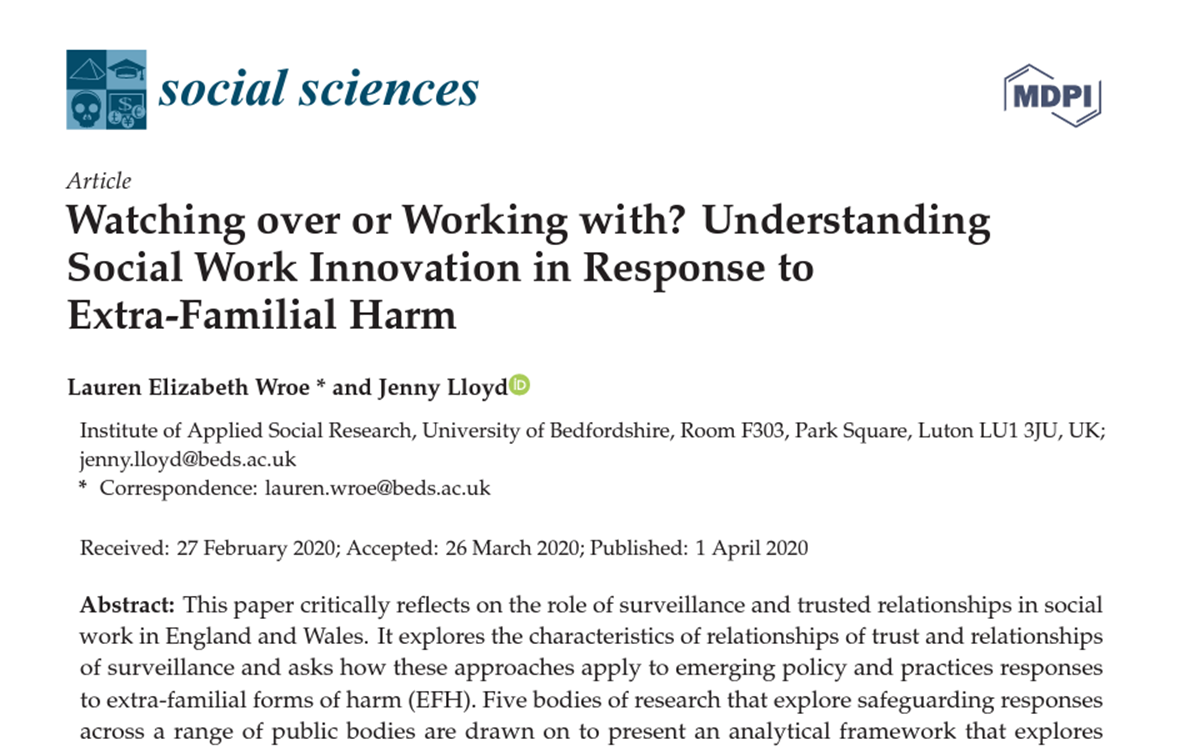
Watching over or Working with? Understanding Social Work Innovation in Response to Extra-Familial Harm
Wroe & Lloyd (2020). This paper critically reflects on the role of surveillance and trusted relationships in social work in England and Wales.
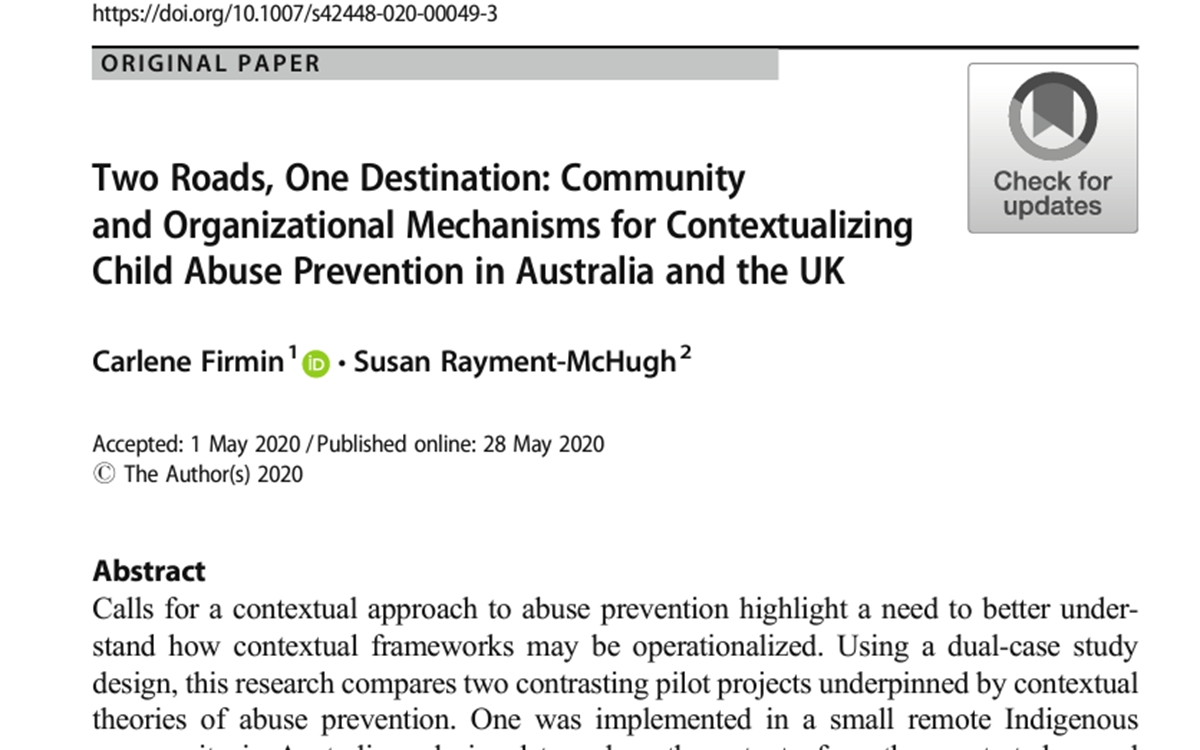
Two Roads, One Destination: Community and Organizational Mechanisms for Contextualizing Child Abuse Prevention in Australia and the UK
Firmin & Rayment-McHugh (2020). Using a dual-case study design, this research compares two contrasting pilot projects underpinned by contextual theories of abuse prevention.
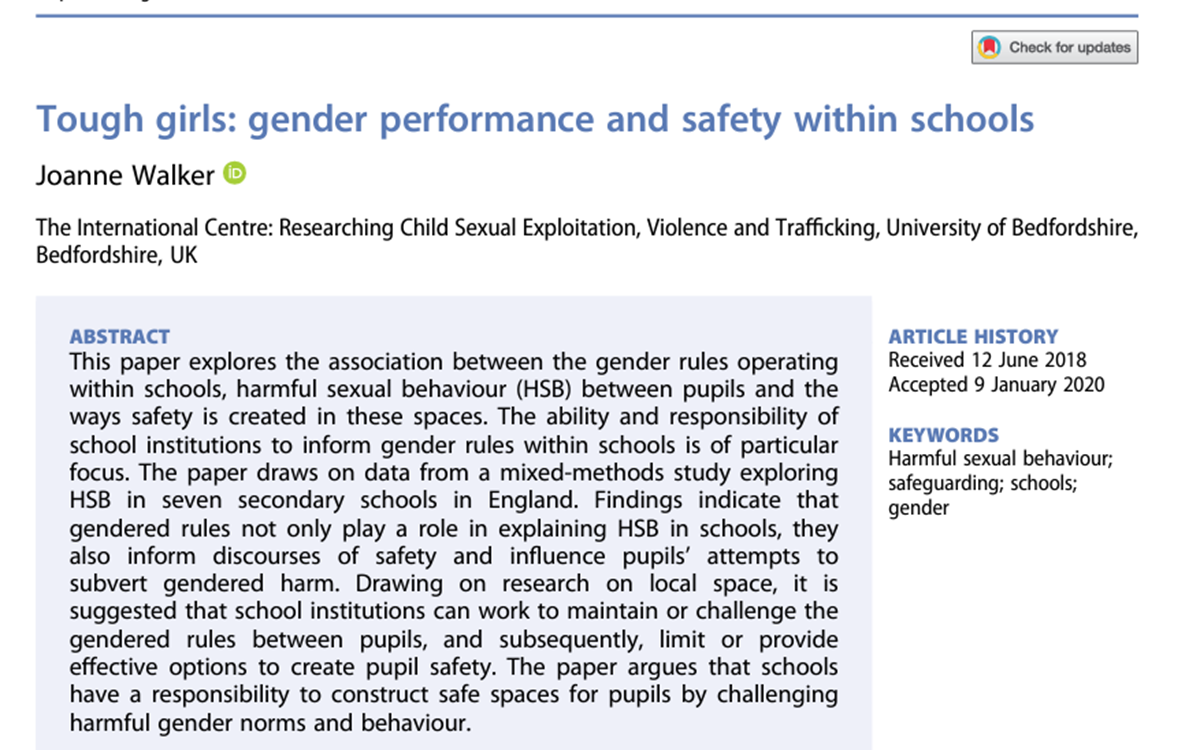
Tough girls: gender performance and safety within schools
Walker (2020). This paper explores the association between the gender rules operating within schools, harmful sexual behaviour (HSB) between pupils and the ways safety is created in these spaces.
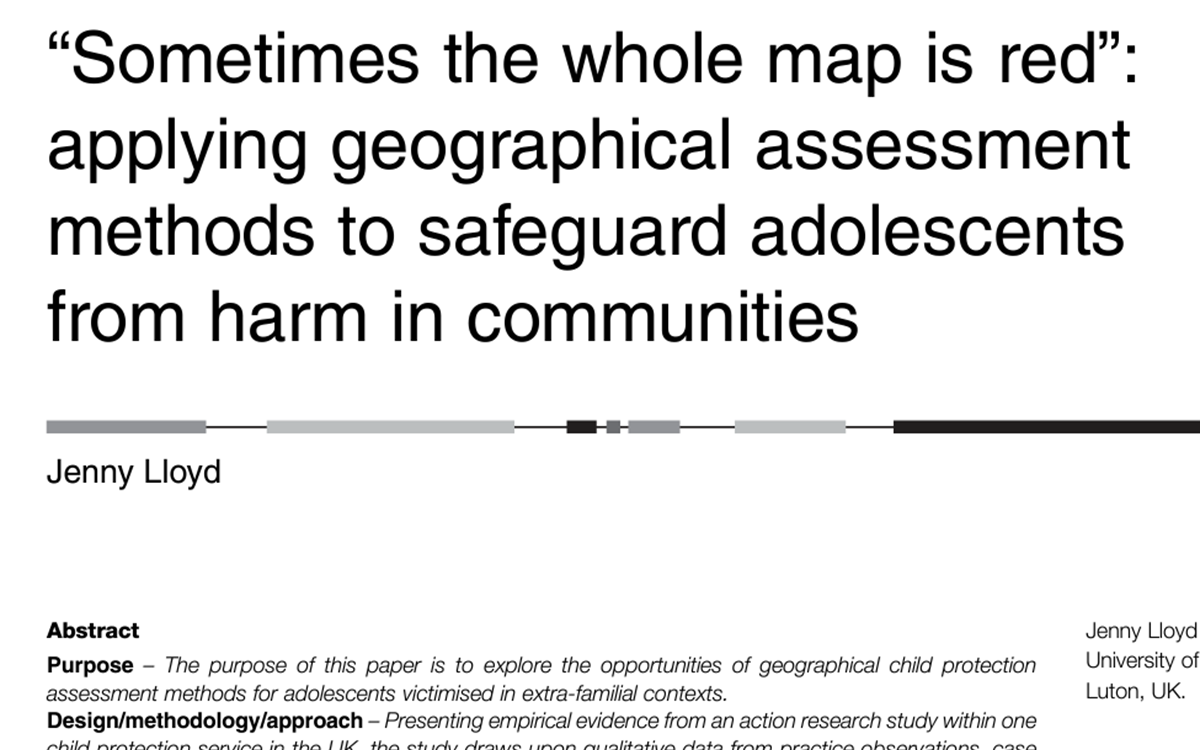
“Sometimes the whole map is red”: applying geographical assessment methods to safeguard adolescents from harm in communities
Lloyd (2020). The purpose of this paper is to explore the opportunities of geographical child protection assessment methods for adolescents victimised in extra-familial contexts.
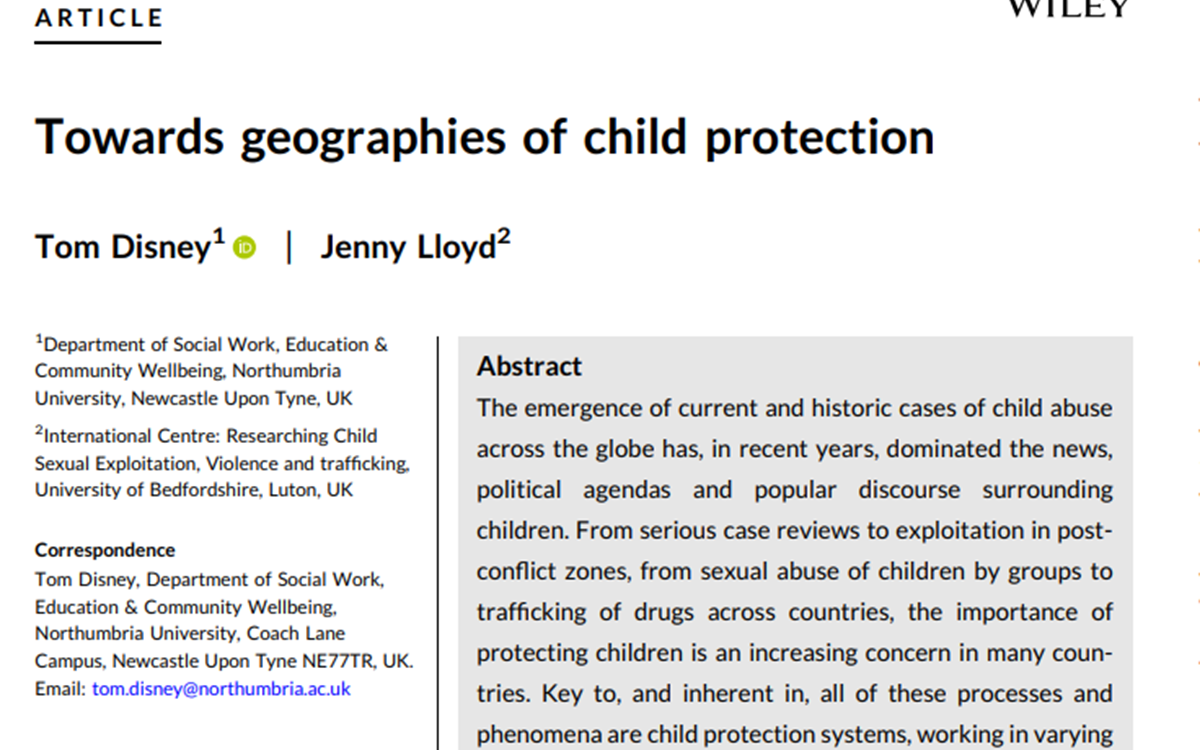
Towards geographies of child protection
Disney & Lloyd (2020). In this article, we seek to develop an introduction to geographies of child protection, producing an initial critical review which points to future research avenues in this field.
2019
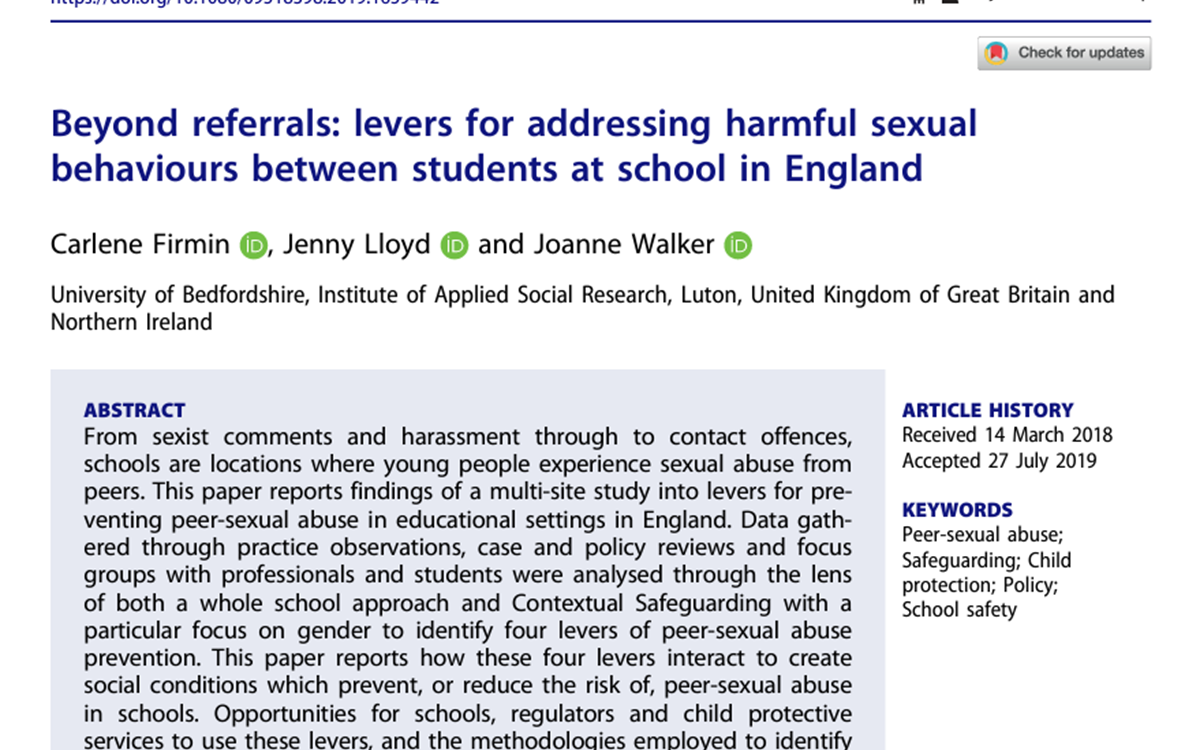
Beyond referrals: levers for addressing harmful sexual behaviours between students at school in England
Firmin, Lloyd & Walker (2018)
This paper reports findings of a multi-site study into levers for preventing peer-sexual abuse in educational settings in England.
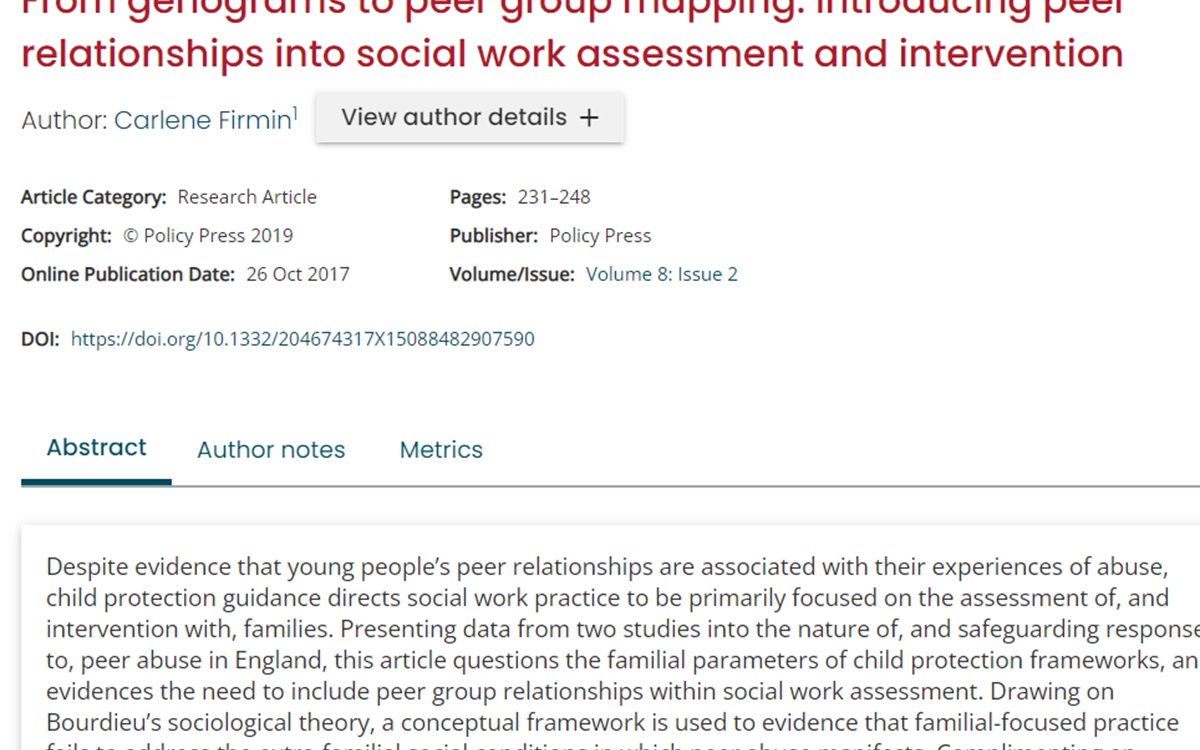
From genograms to peer group mapping: introducing peer relationships into social work assessment and intervention
Firmin (2019). Presenting data from two studies into the nature of, and safeguarding response to, peer abuse in England, this article questions the familial parameters of child protection frameworks, and evidences the need to include peer group relationships within social work assessment.
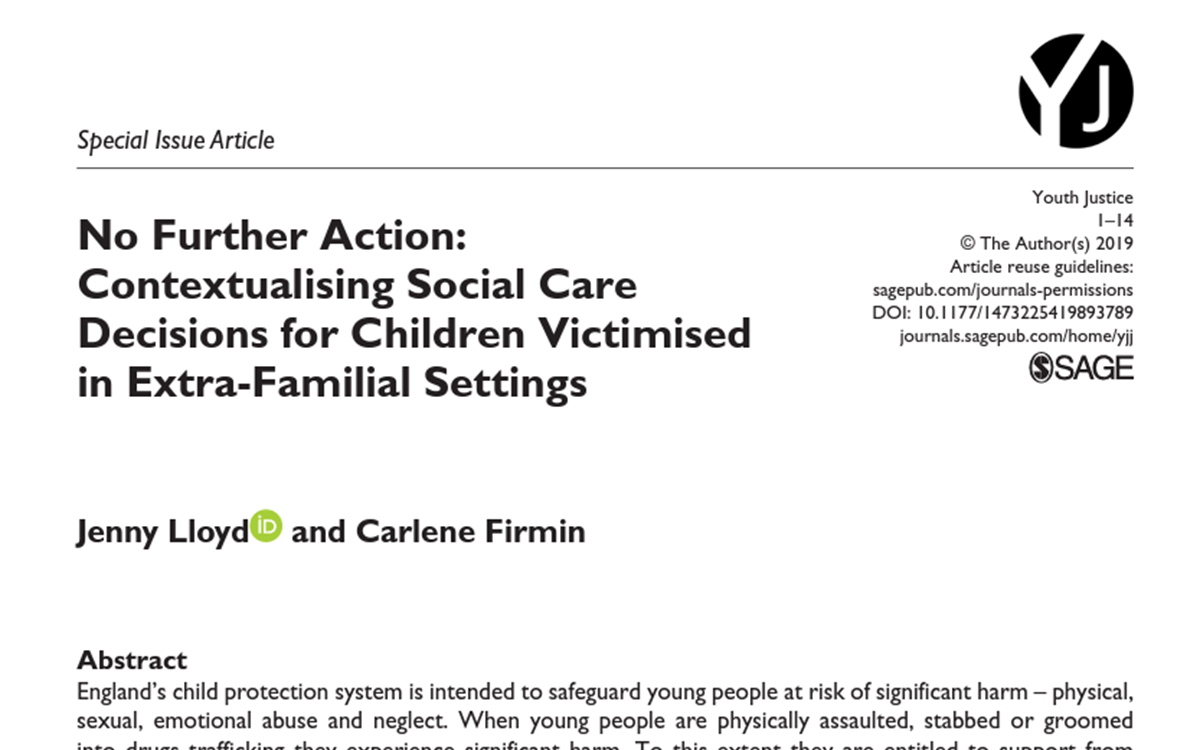
No Further Action: Contextualising Social Care Decisions for Children Victimised in Extra-Familial Settings
Lloyd & Firmin (2019). Using findings from one component of a mixed method multi-site study, data from referrals and assessments into children’s social care is examined to identify the extent to which the right support and protection is realised.
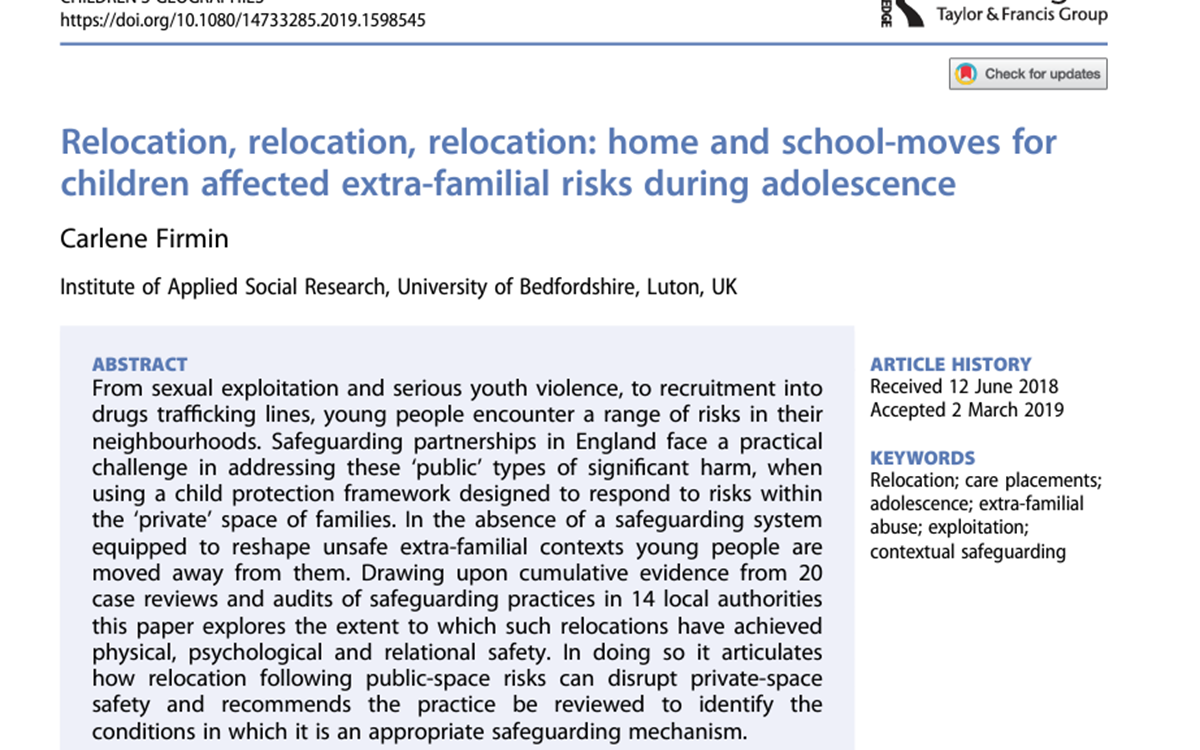
Relocation, relocation, relocation: home and school-moves for children affected extra-familial risks during adolescence
Firmin (2019). Drawing upon cumulative evidence from 20 case reviews and audits of safeguarding practices in 14 local authorities this paper explores the extent to which such relocations have achieved physical, psychological and relational safety.
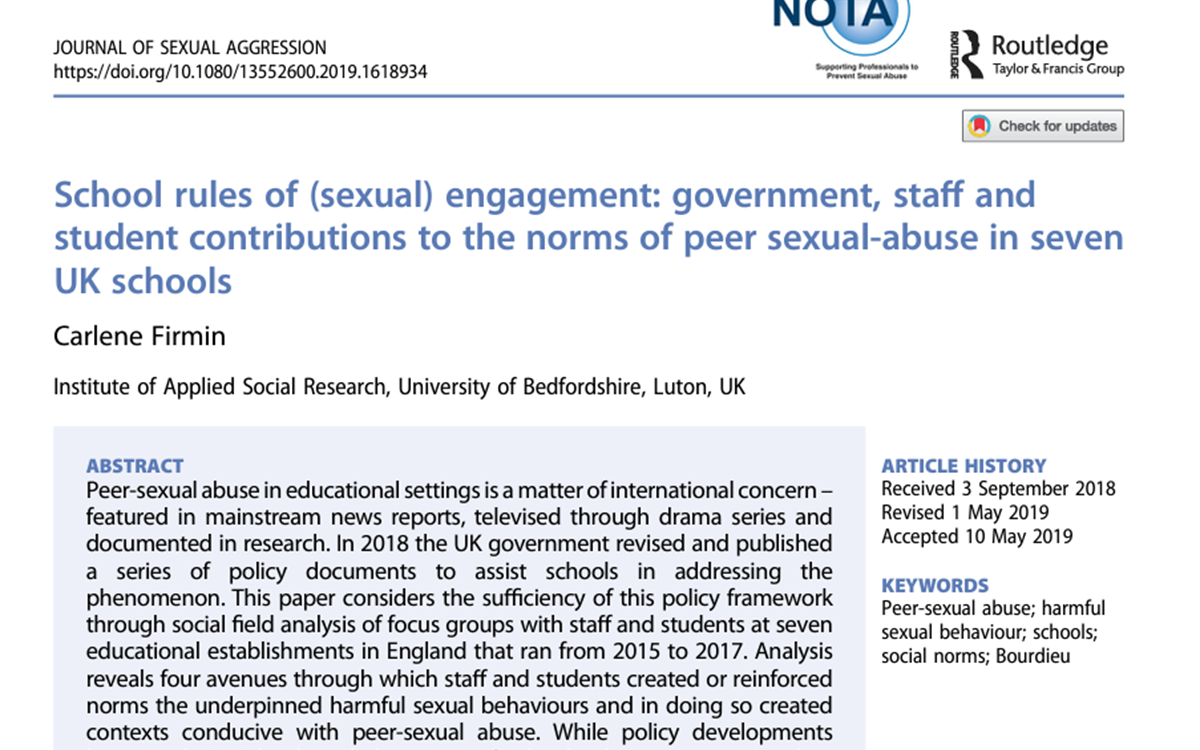
School rules of (sexual) engagement: government, staff and student contributions to the norms of peer sexual-abuse in seven UK schools
Firmin (2019). This paper considers the sufficiency of statutory policy frameworks through social field analysis of focus groups with staff and students at seven educational establishments in England that ran from 2015 to 2017.
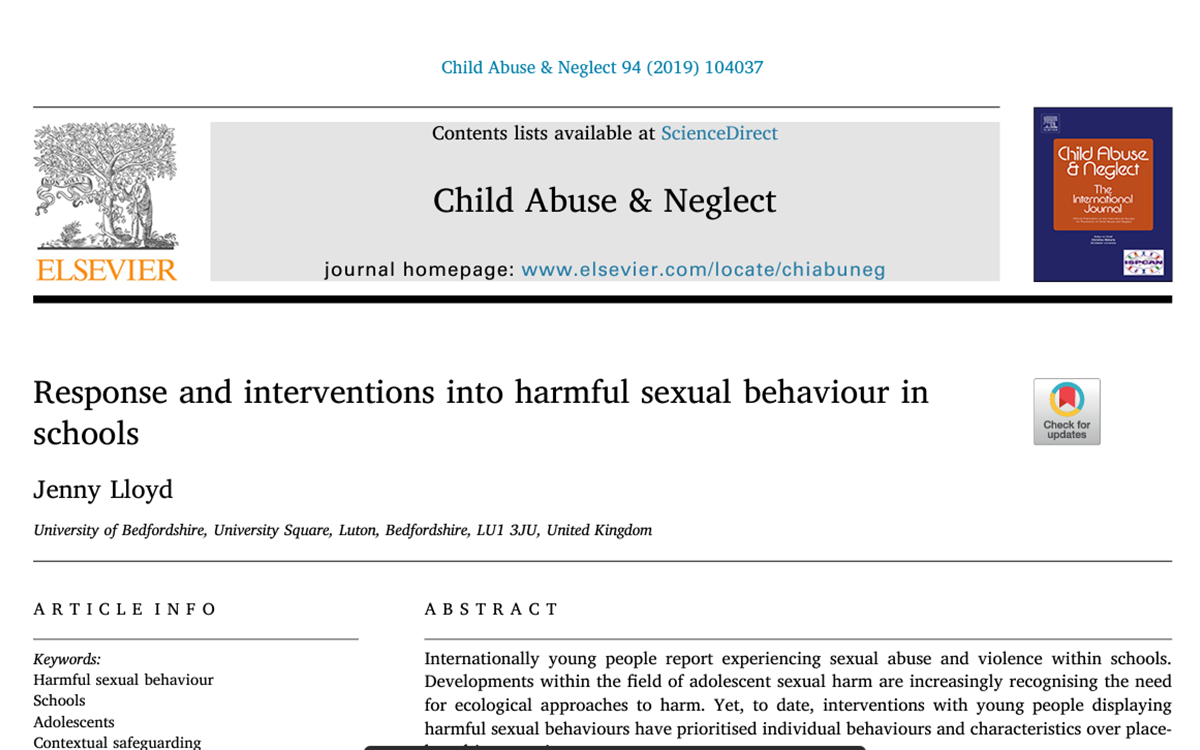
Response and interventions into harmful sexual behaviour in schools
Lloyd (2019). This article presents empirical evidence from a mixed-methods study aimed at understanding the enablers and barriers to preventing and responding to harmful sexual behaviour in schools.
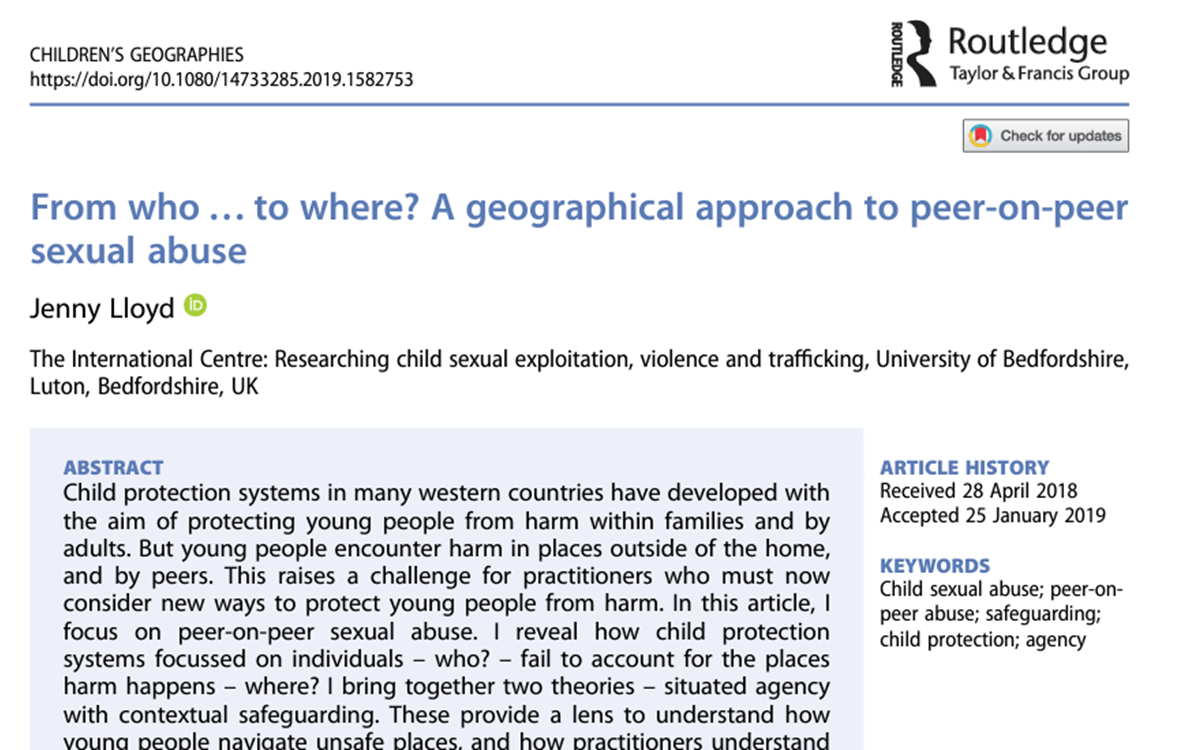
From who … to where? A geographical approach to peer-on-peer sexual abuse
Lloyd (2019). In this article, I focus on peer-on-peer sexual abuse. I reveal how child protection systems focussed on individuals – who? – fail to account for the places harm happens – where?
2018
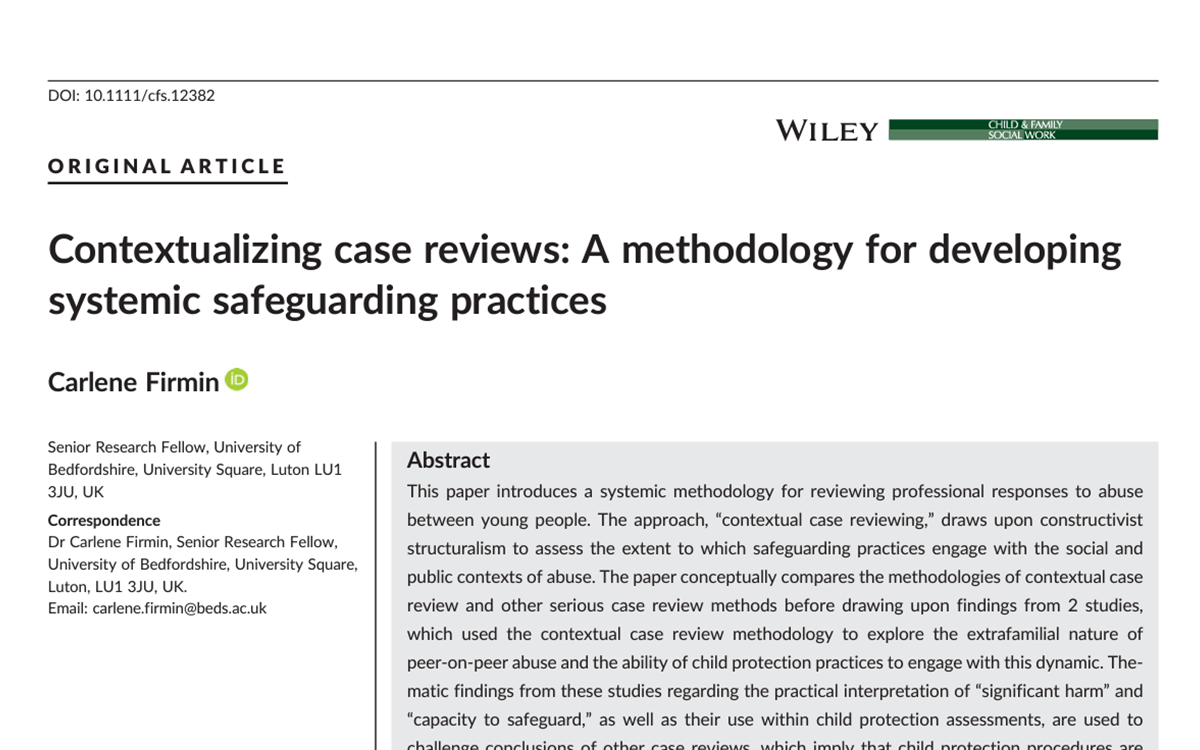
Contextualizing case reviews: A methodology for developing systemic safeguarding practices
Firmin (2018)
This paper introduces a systemic methodology for reviewing professional responses to abuse between young people.
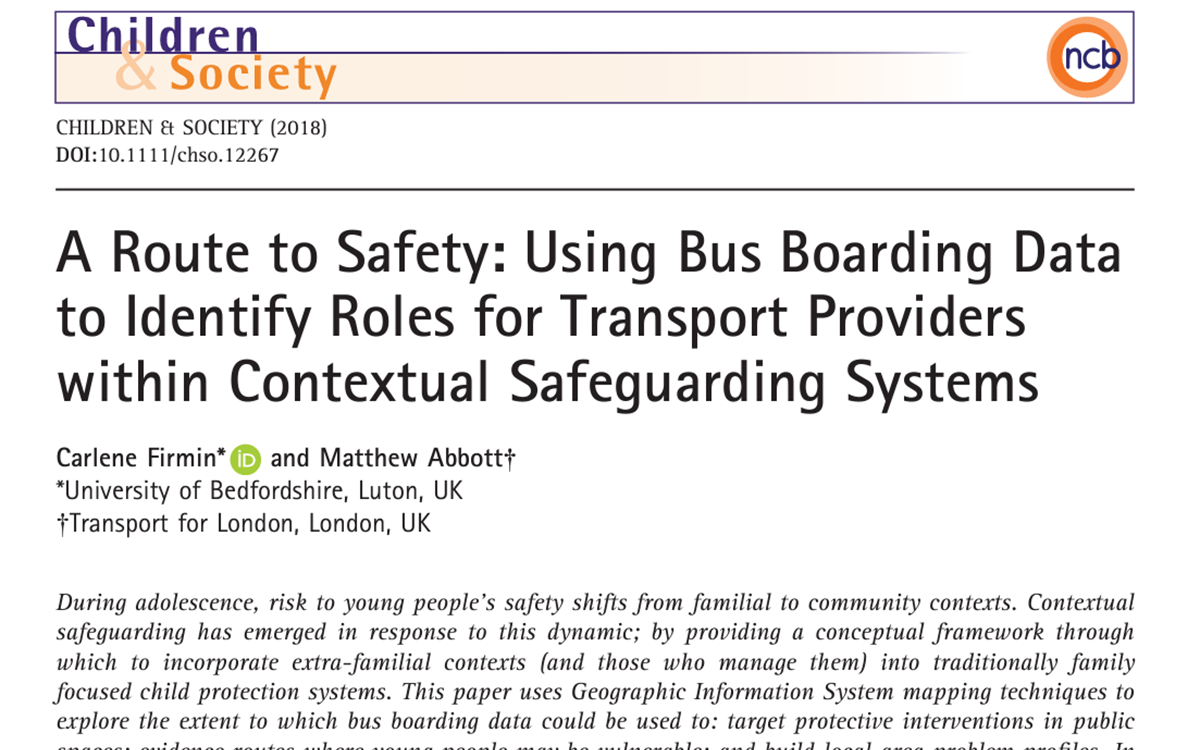
A Route to Safety: Using Bus Boarding Data to Identify Roles for Transport Providers within Contextual Safeguarding Systems
Firmin and Abbott (2018). This paper uses Geographic Information System mapping techniques to explore the extent to which bus boarding data could be used to: target protective interventions in public spaces; evidence routes where young people may be vulnerable; and build local area problem profiles.
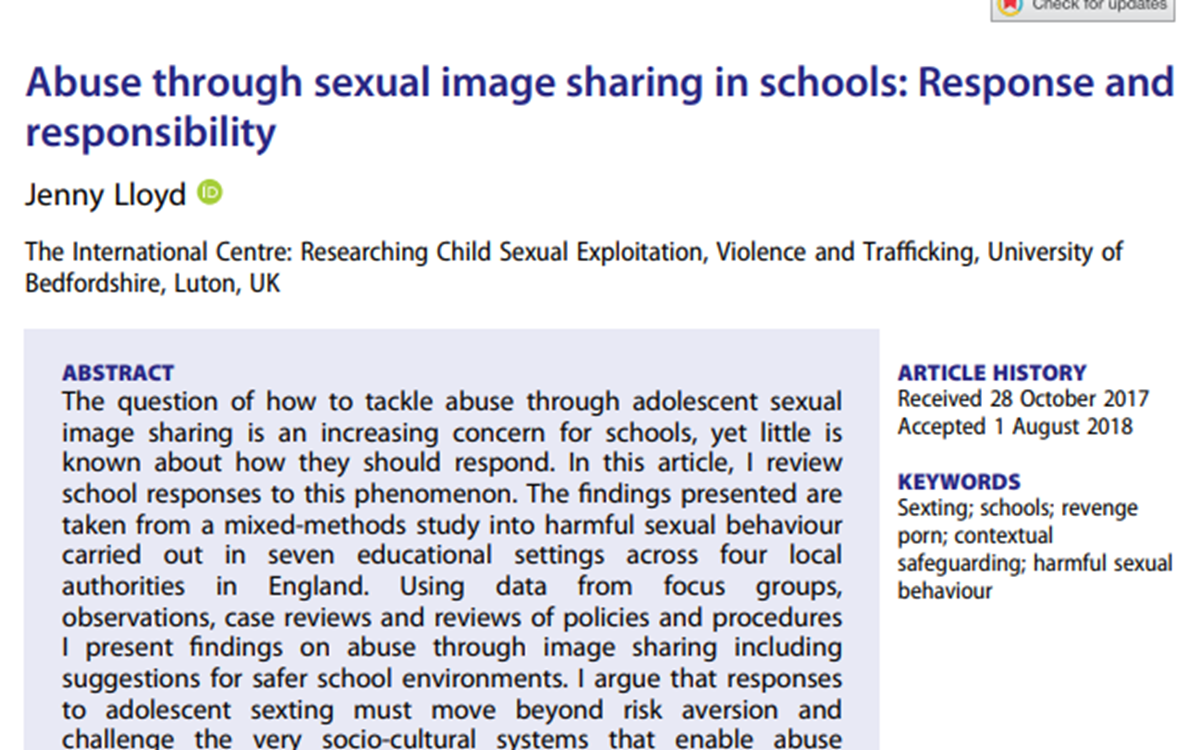
Abuse through sexual image sharing in schools: Response and responsibility
Lloyd (2018). The question of how to tackle abuse through adolescent sexual image sharing is an increasing concern for schools, yet little is known about how they should respond. In this article, I review school responses to this phenomenon.
2017
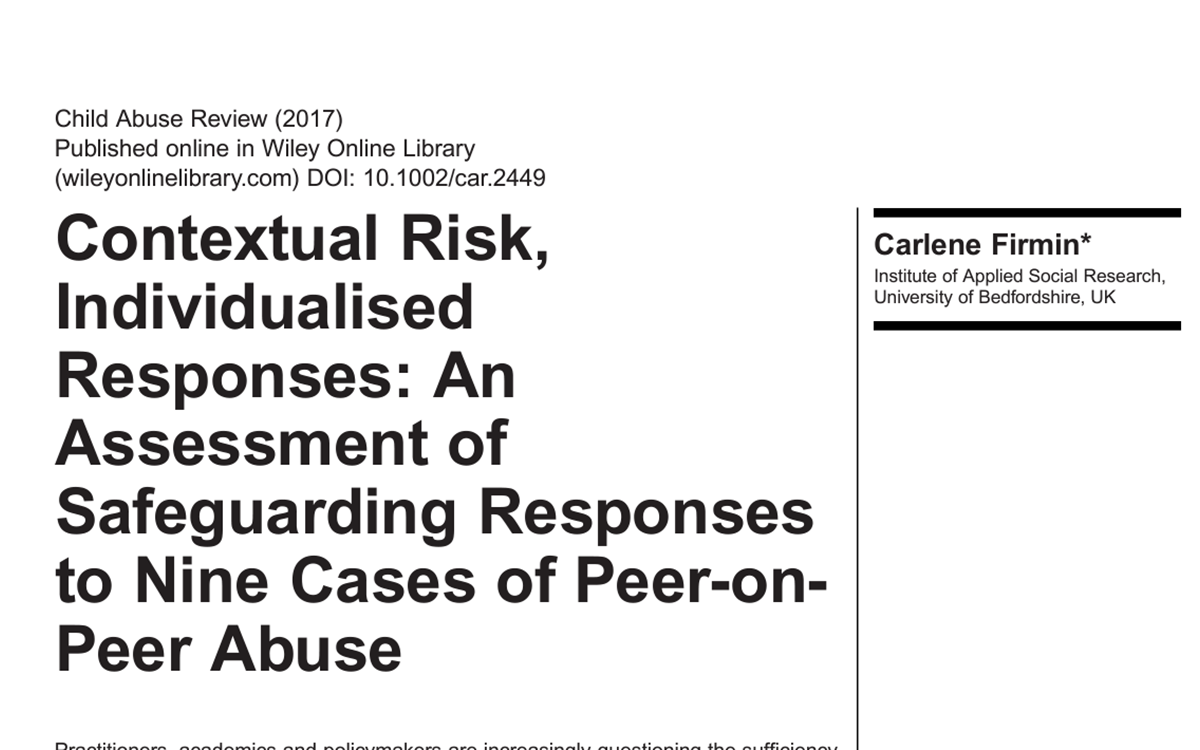
Contextual Risk, Individualised Responses: An Assessment of Safeguarding Responses to Nine Cases of Peer-on-Peer Abuse
Firmin (2017)
Using the findings from an in-depth analysis of nine cases where young people either raped or murdered their peers, this article explores approaches to assessing and intervening with those affected by peer-on-peer abuse.
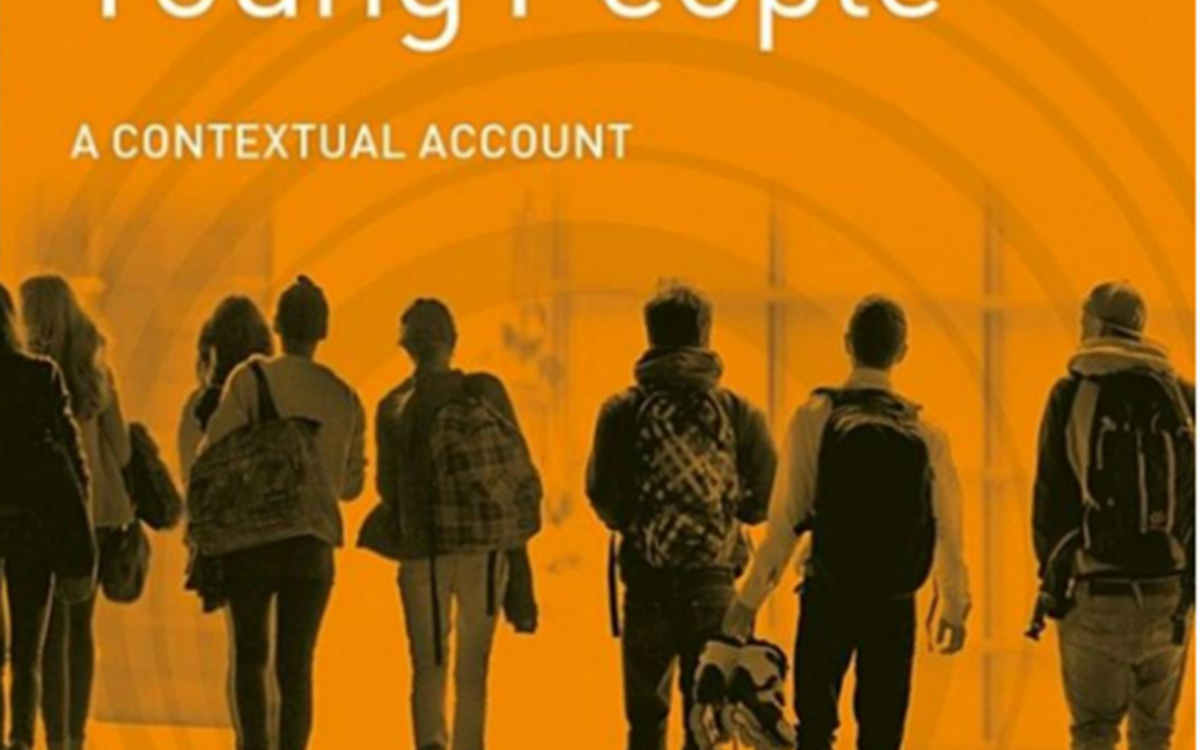
Abuse Between Young People A Contextual Account
Firmin (2017). Abuse Between Young People: A Contextual Account is the first book to offer a contextualised narrative of peer-on-peer abuse that moves beyond recognising an association between environments and individual choice, and illustrates the ways in which such interplay occurs.


